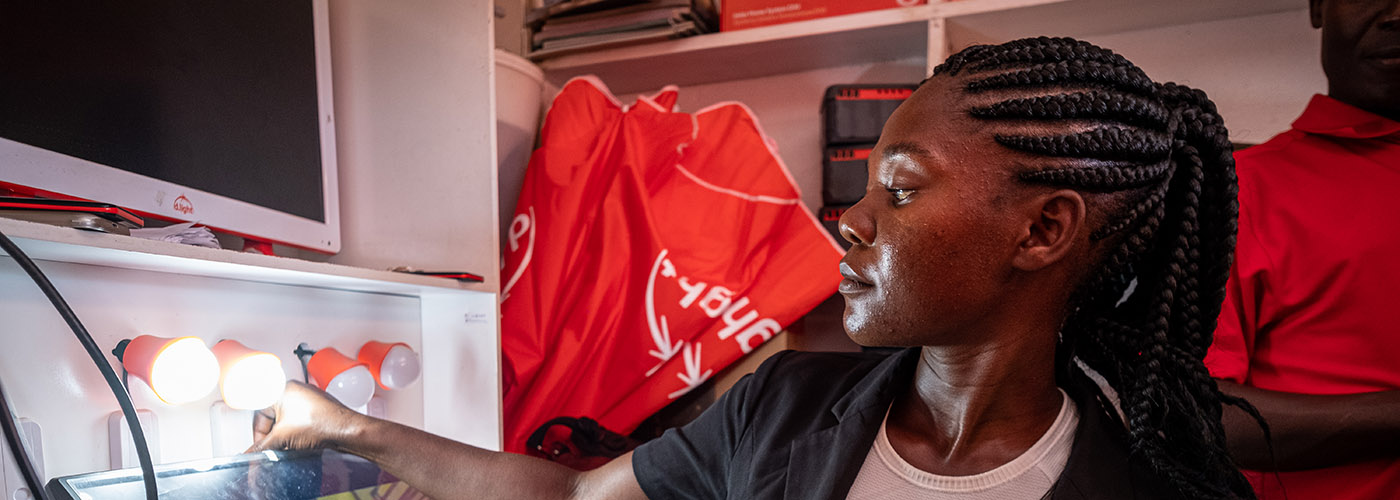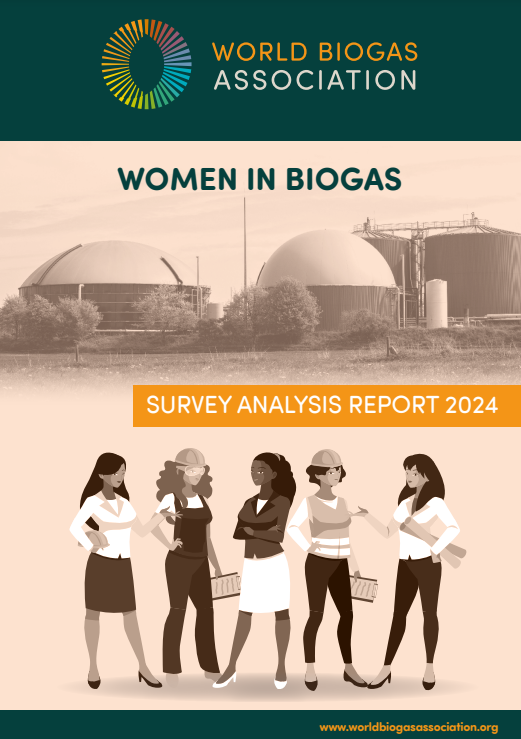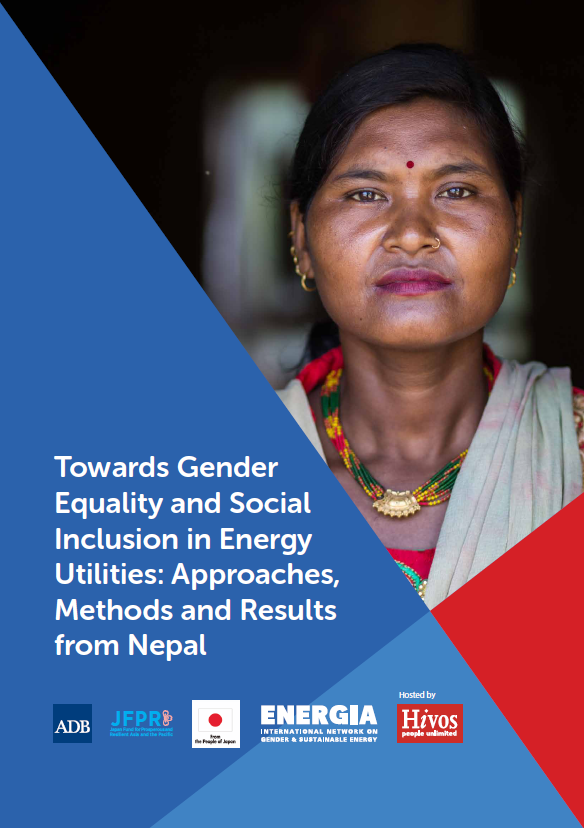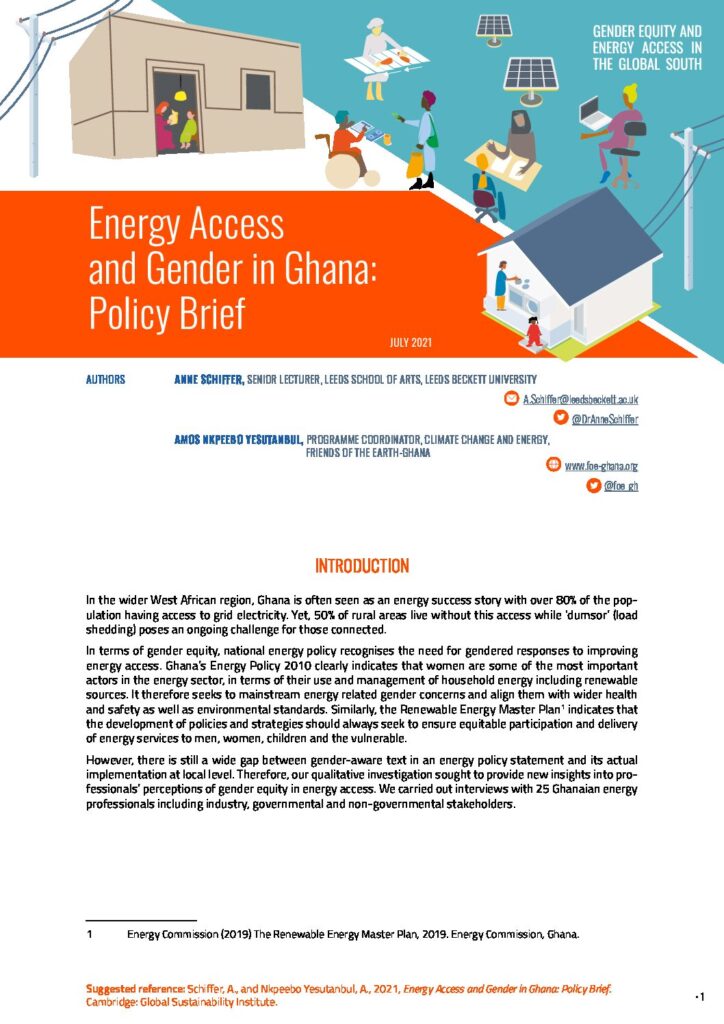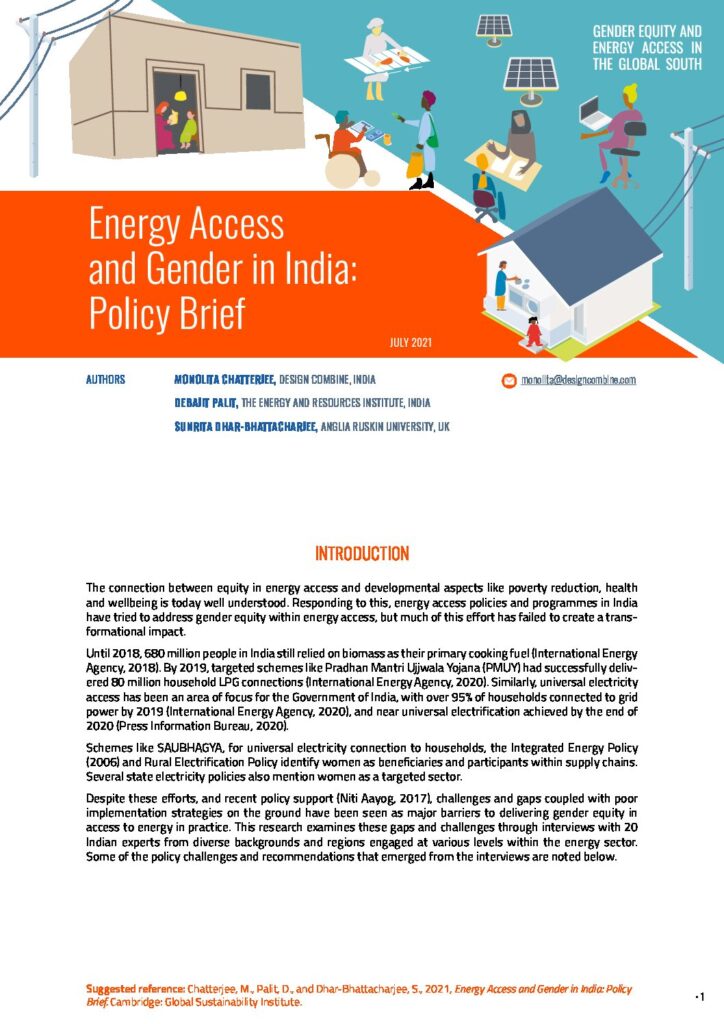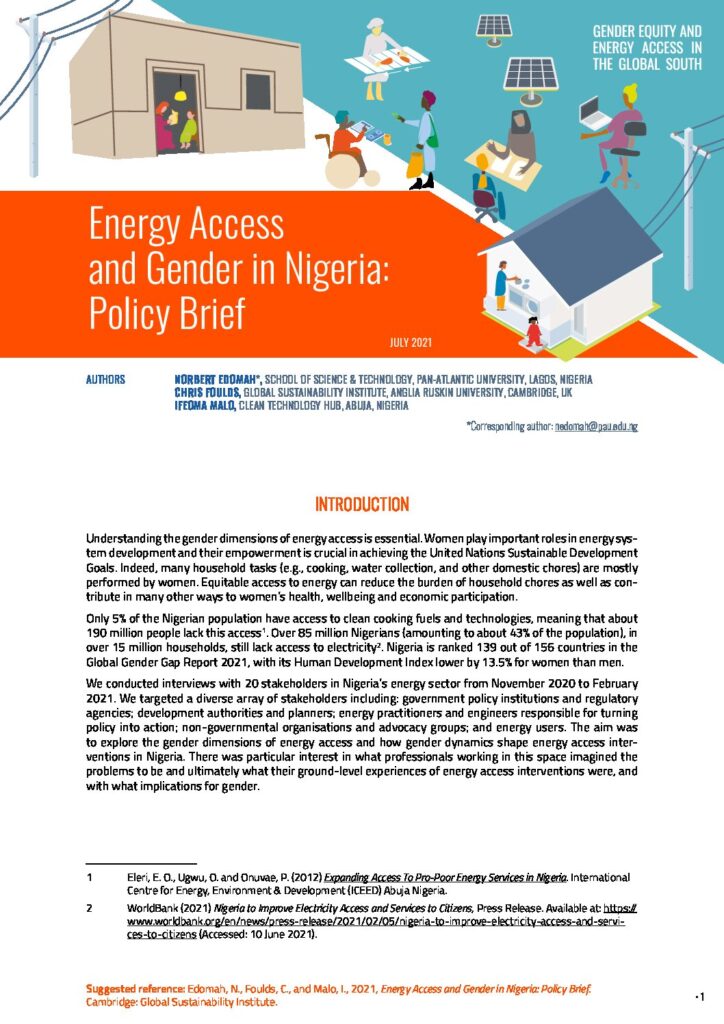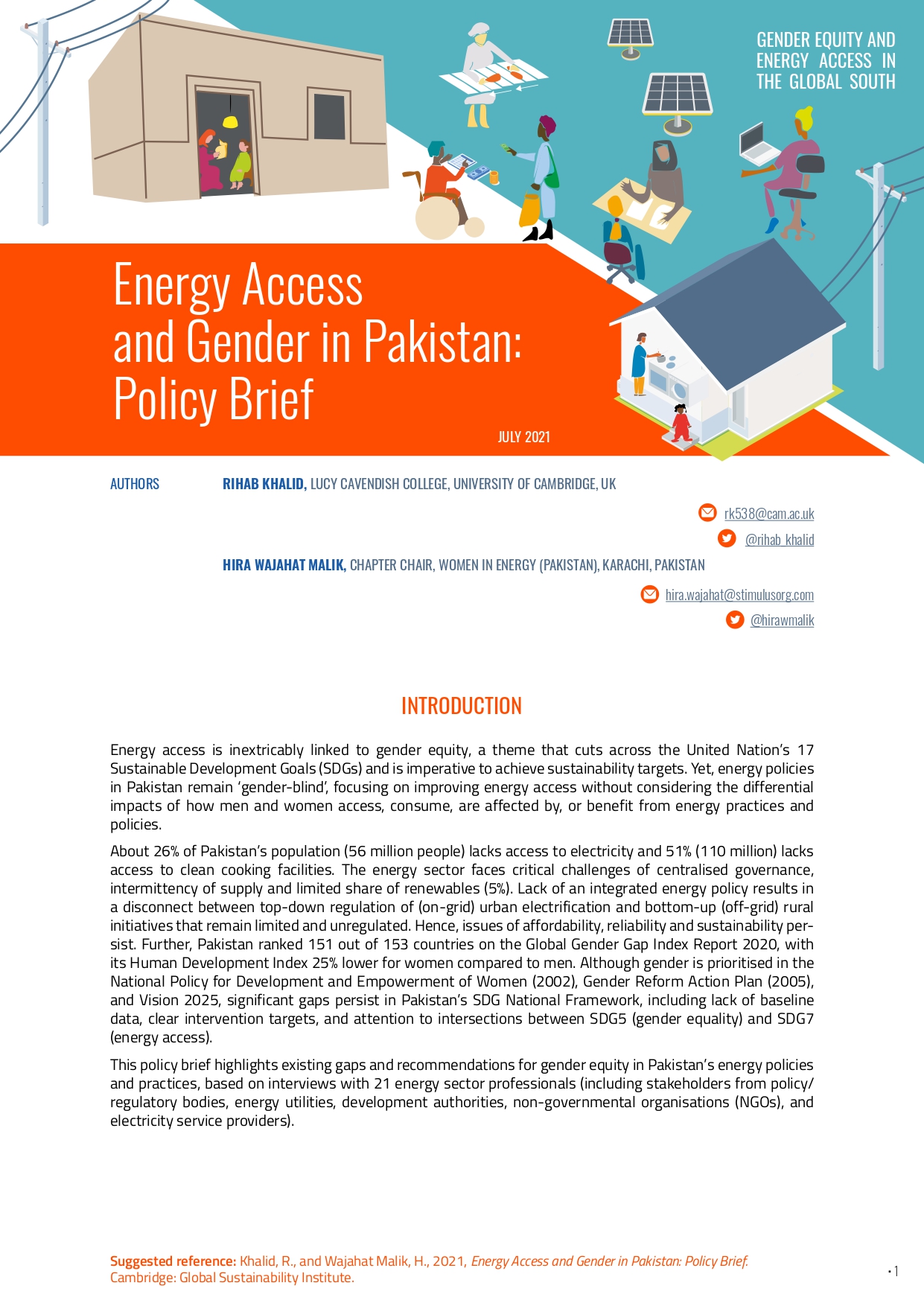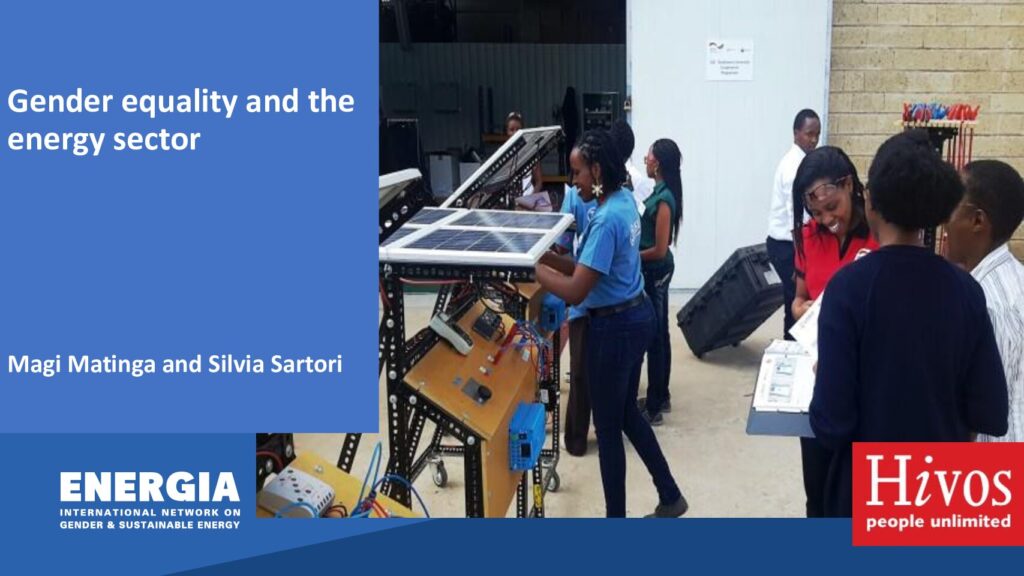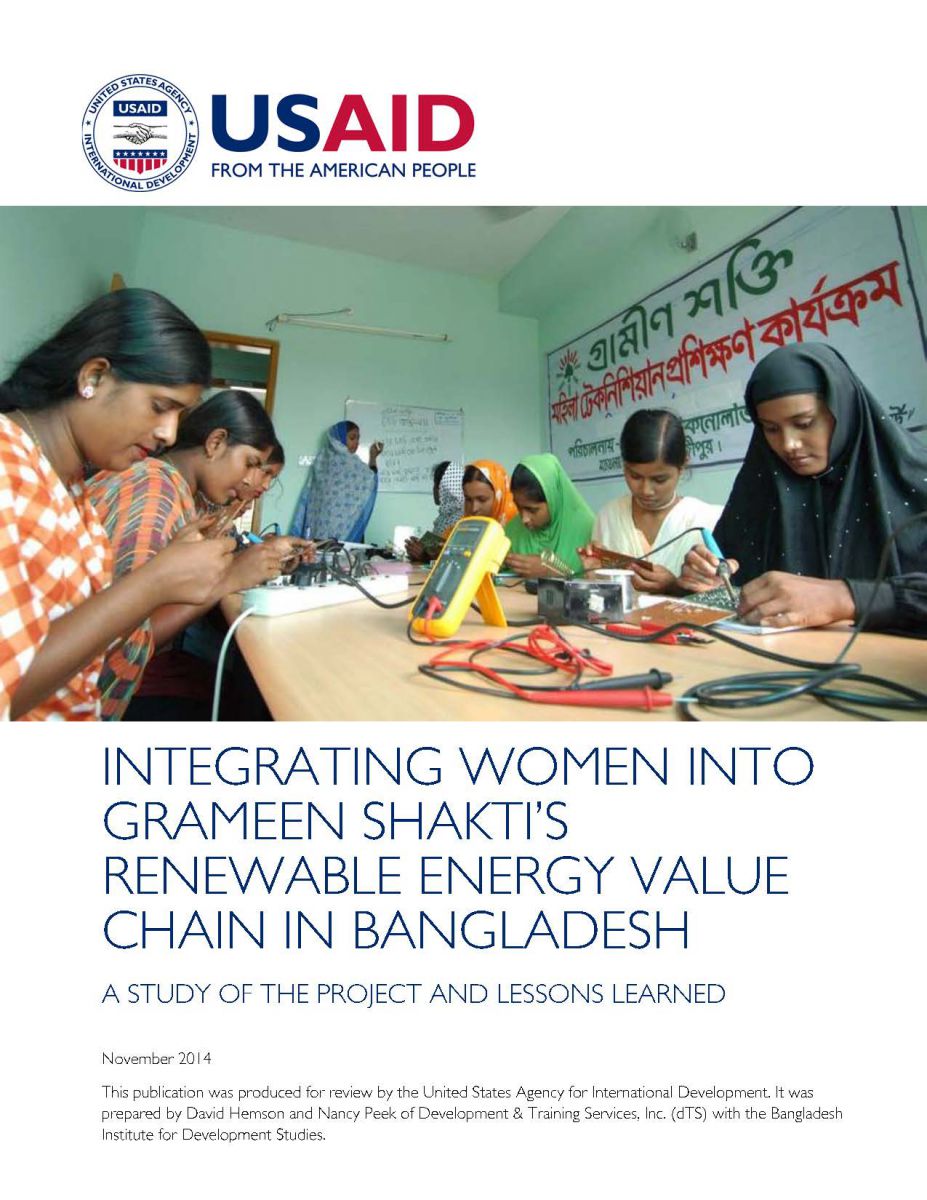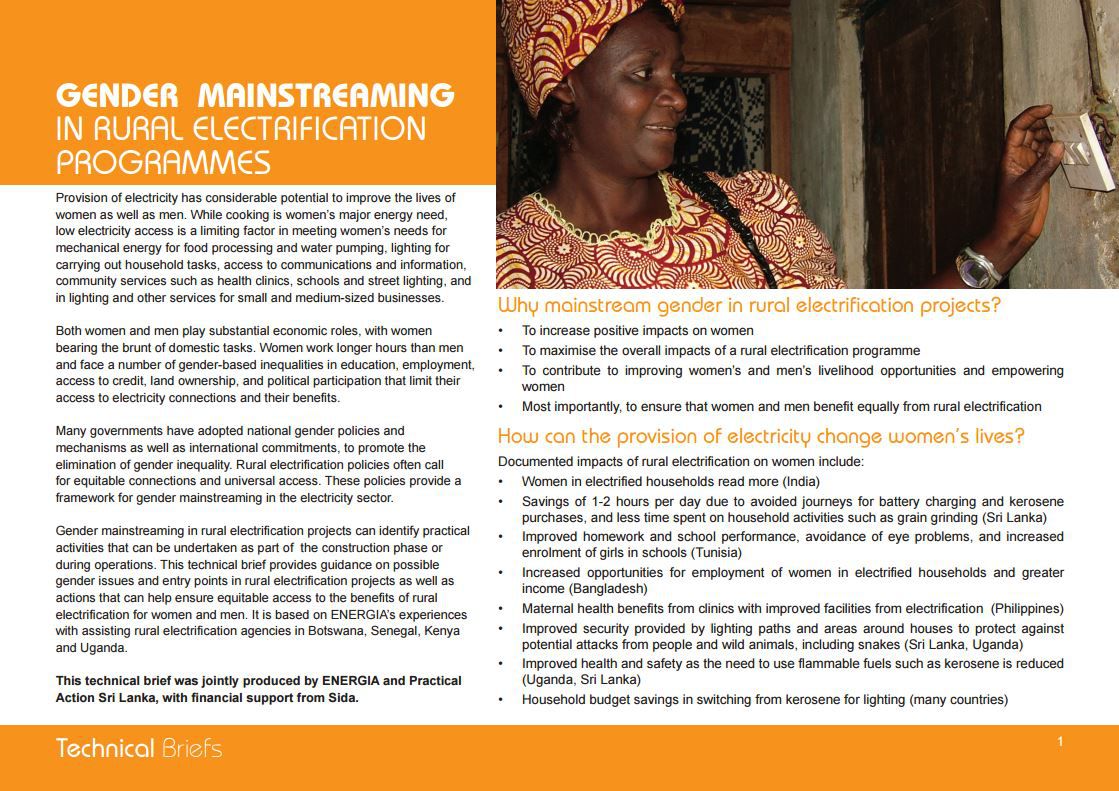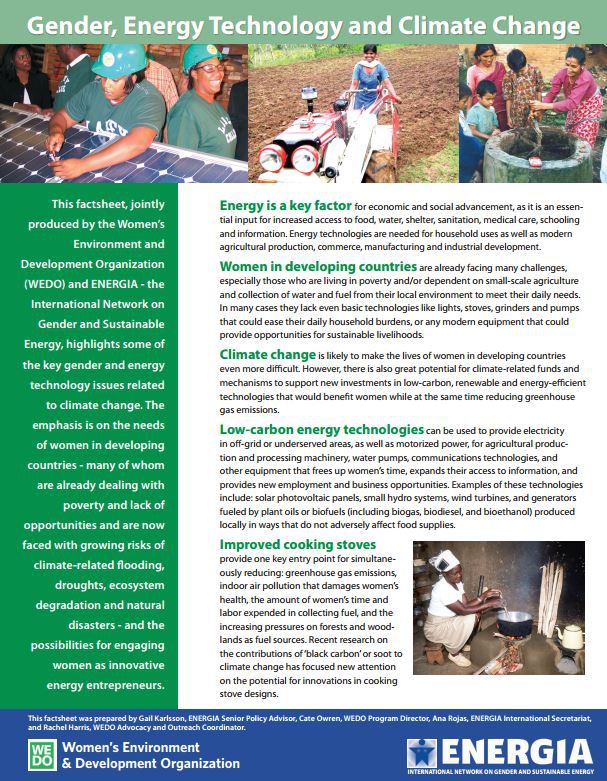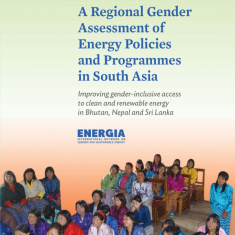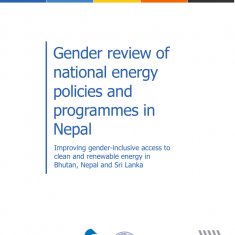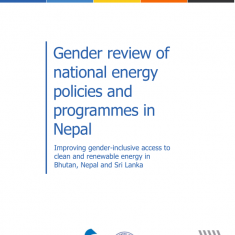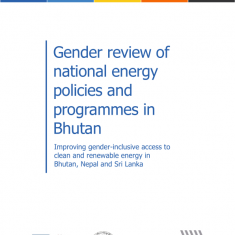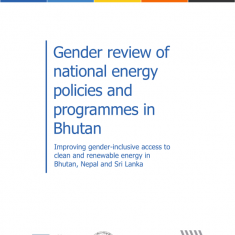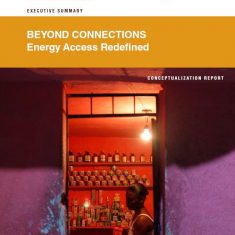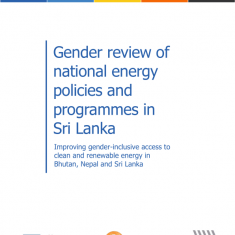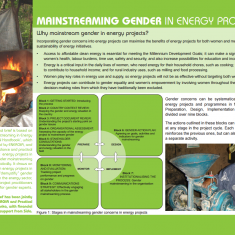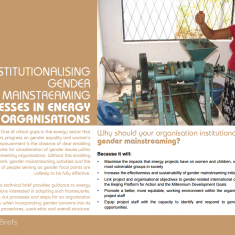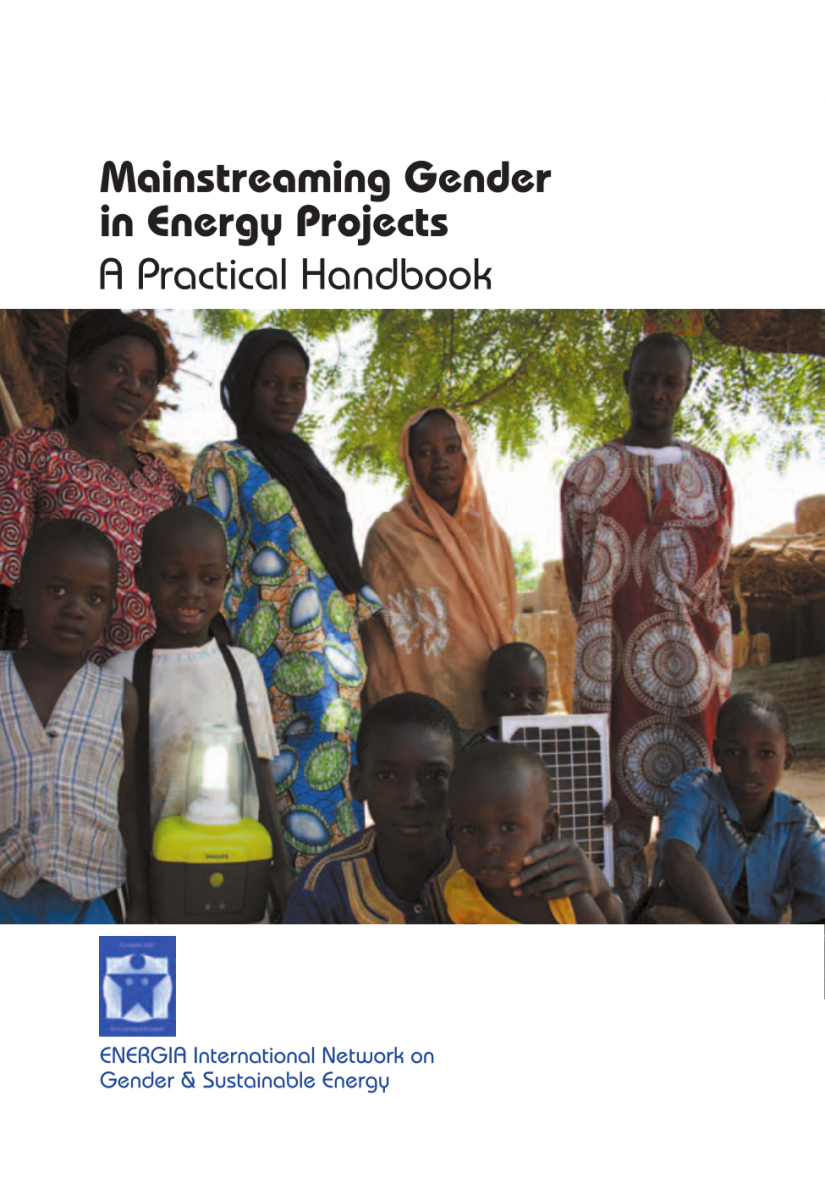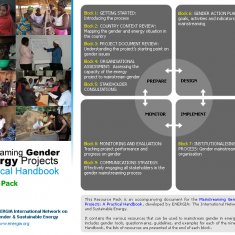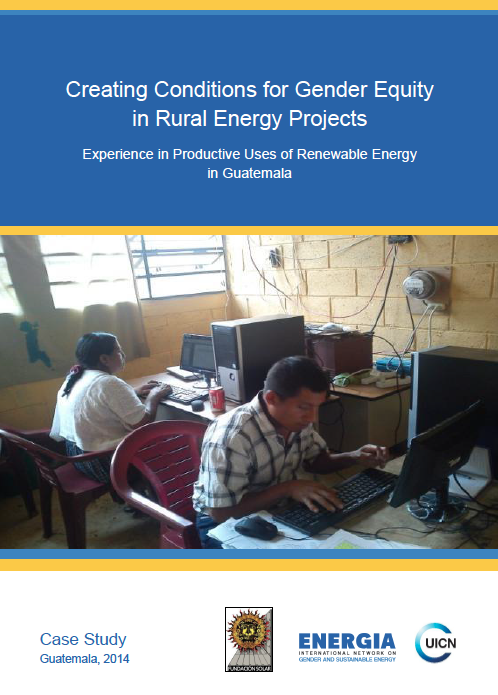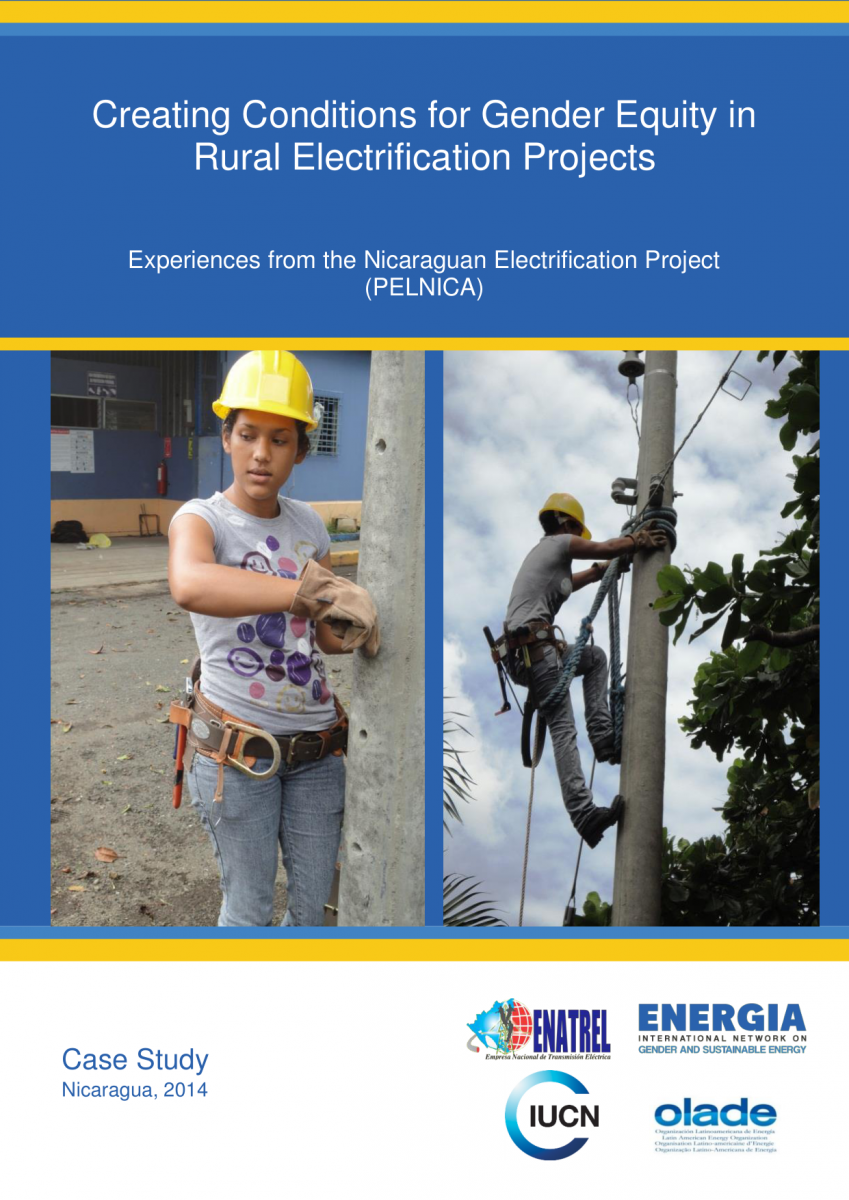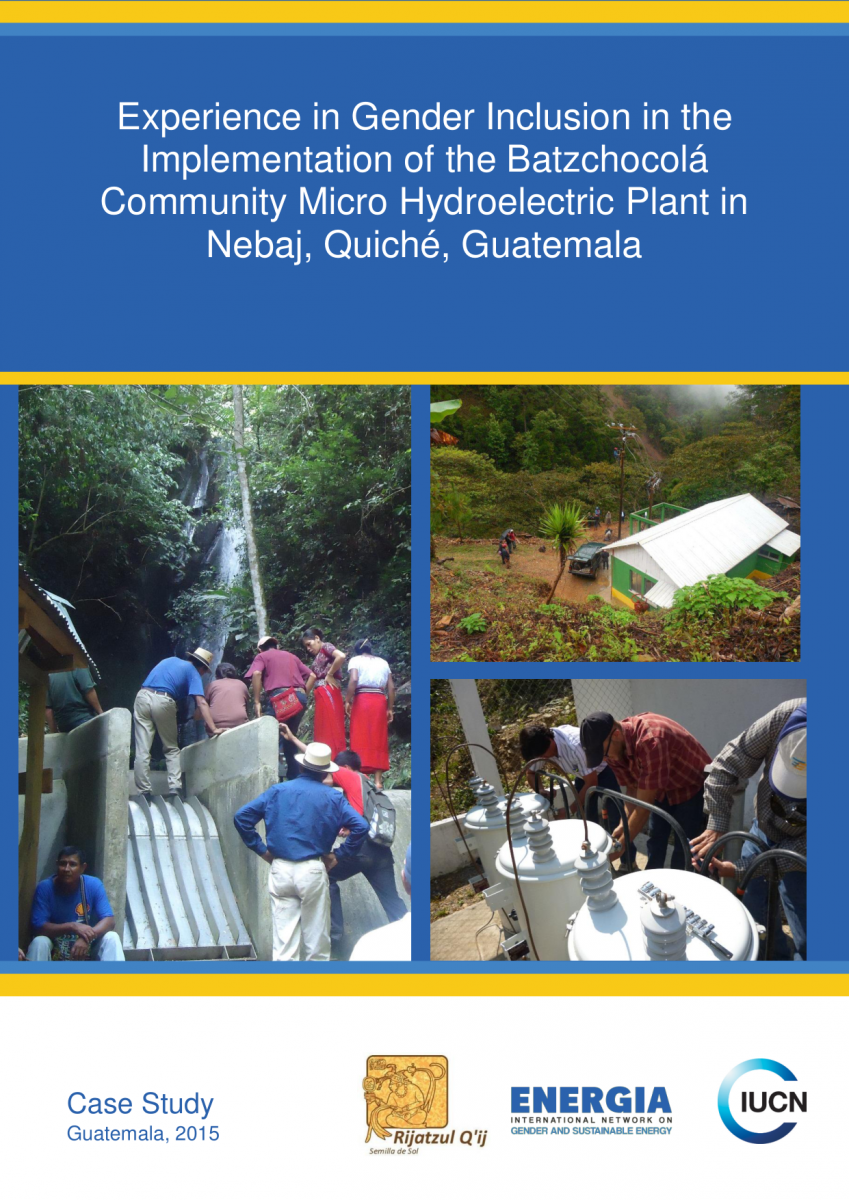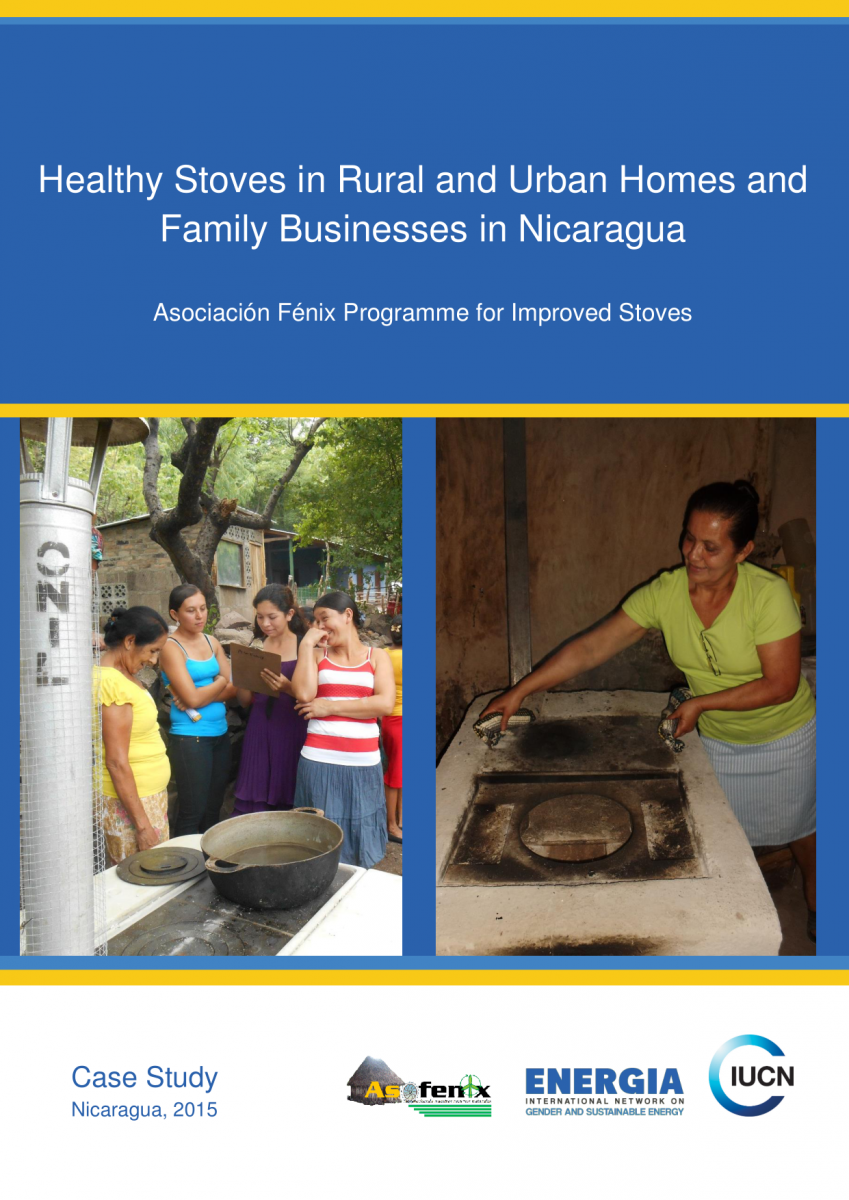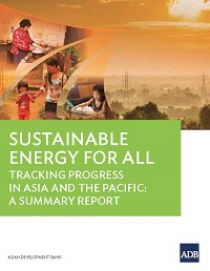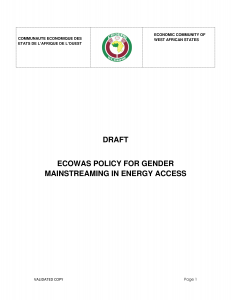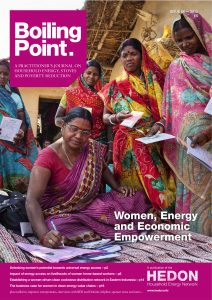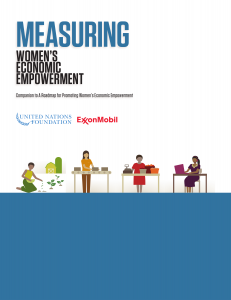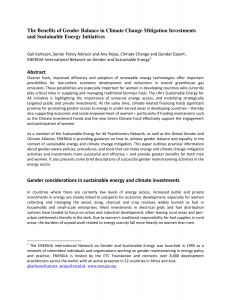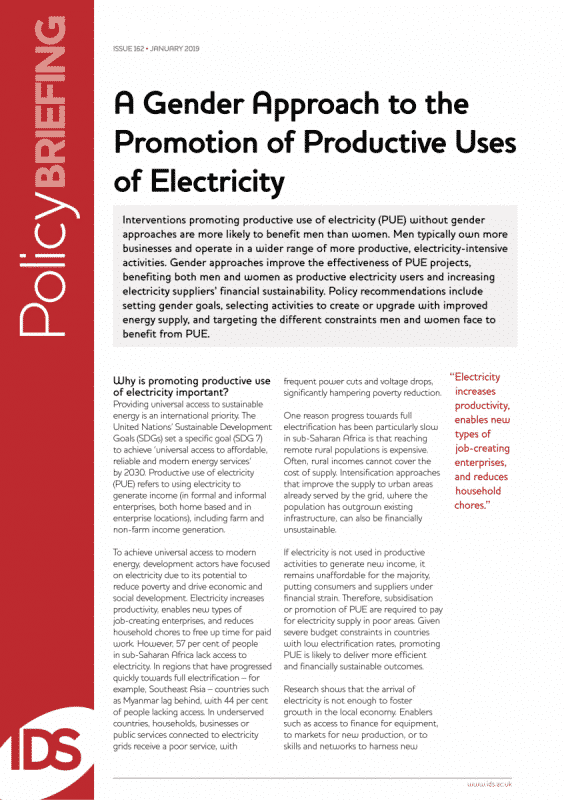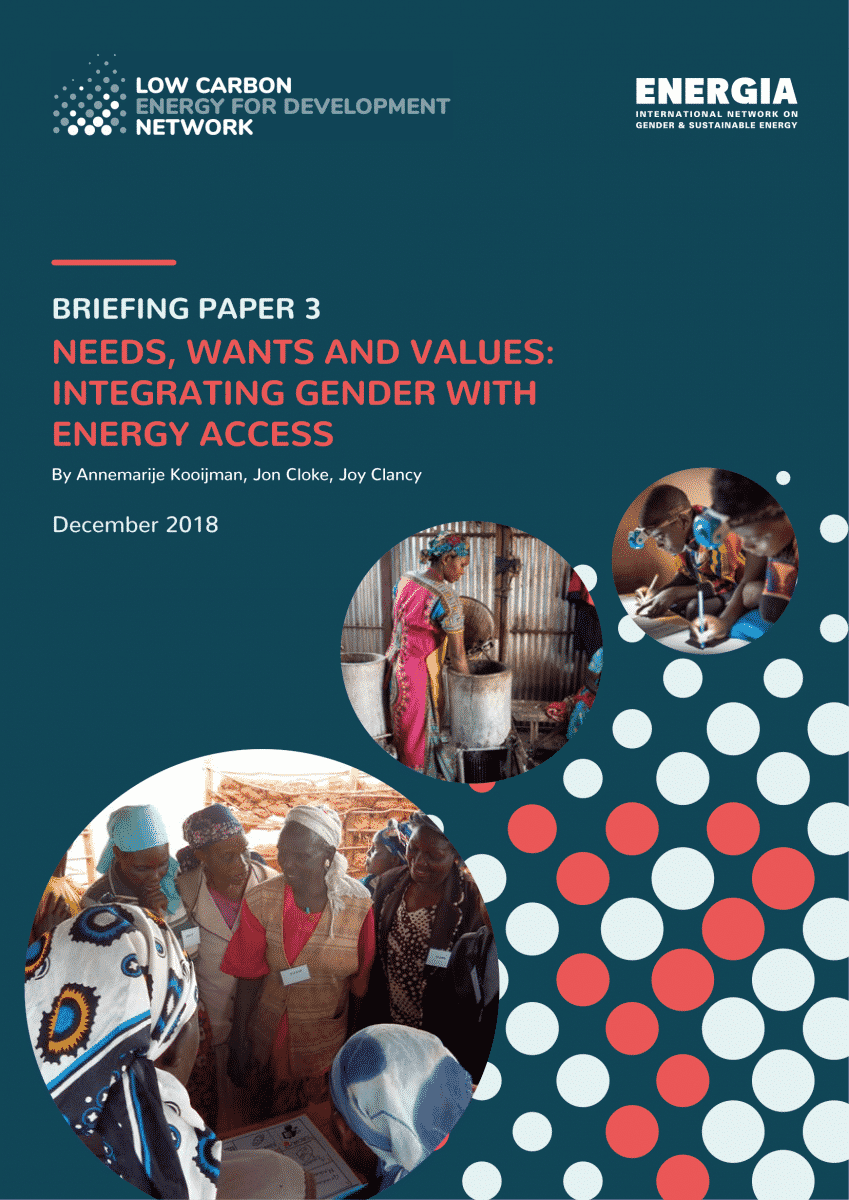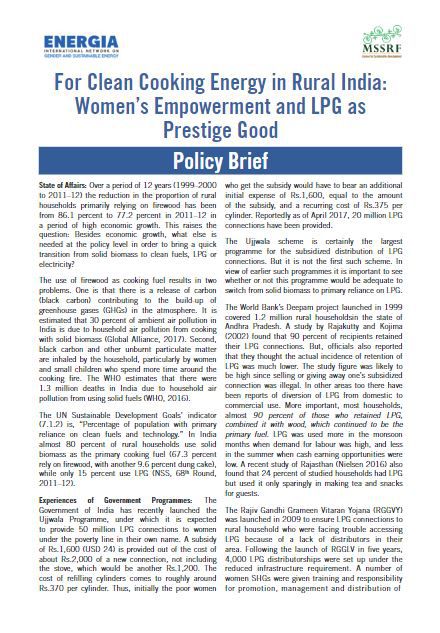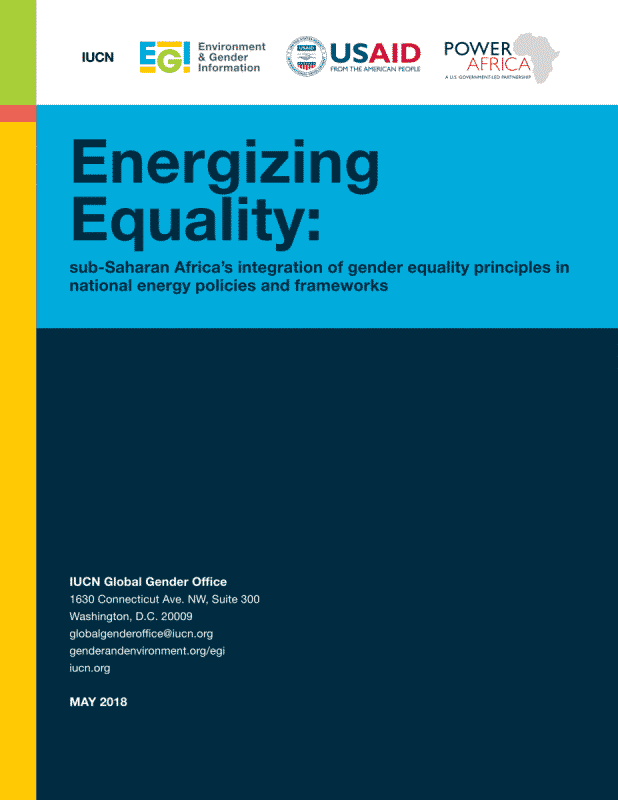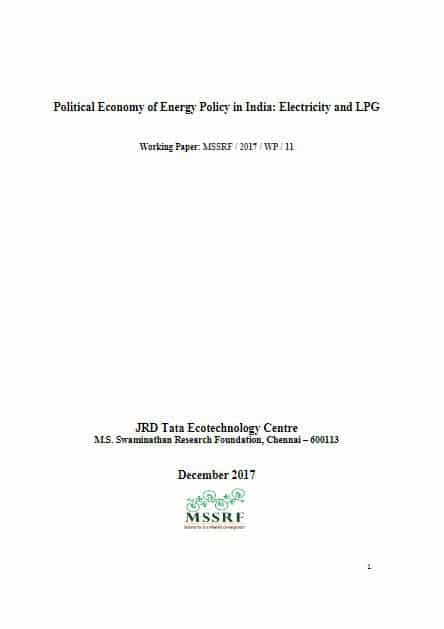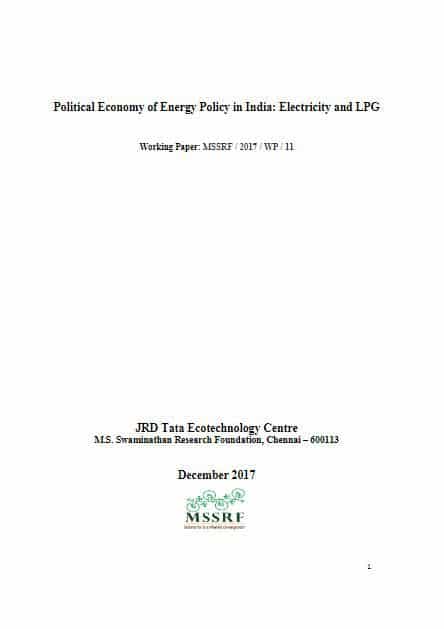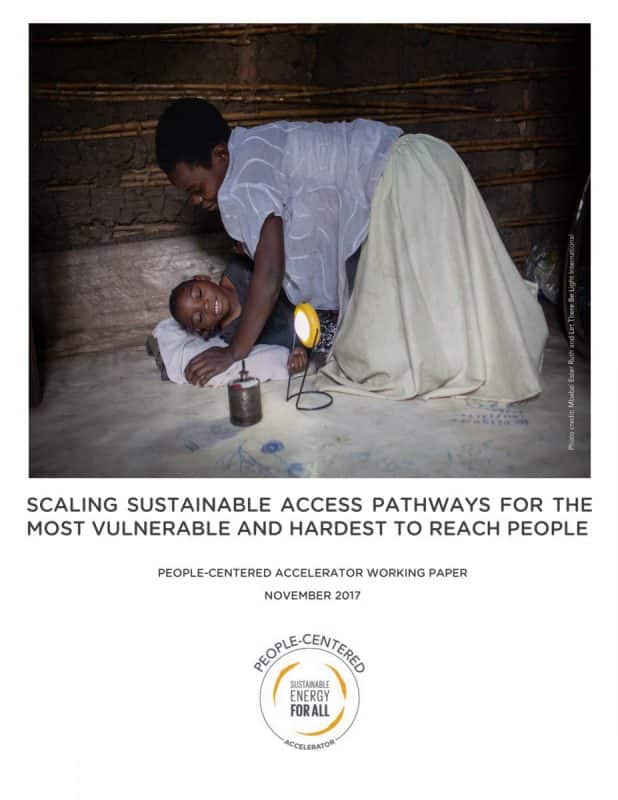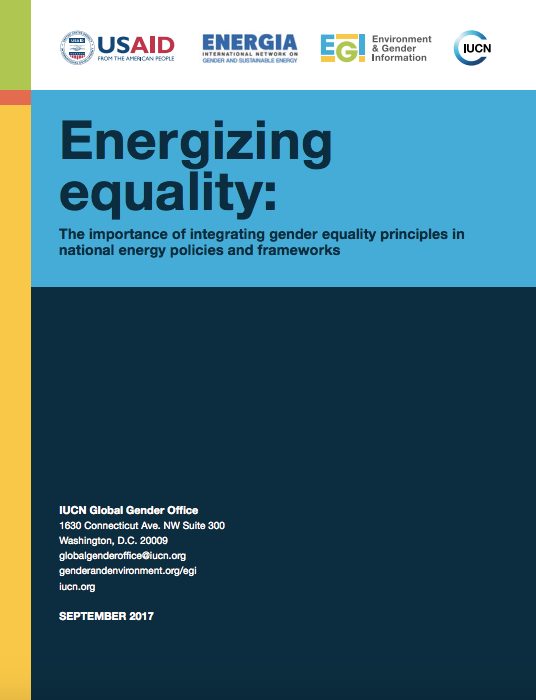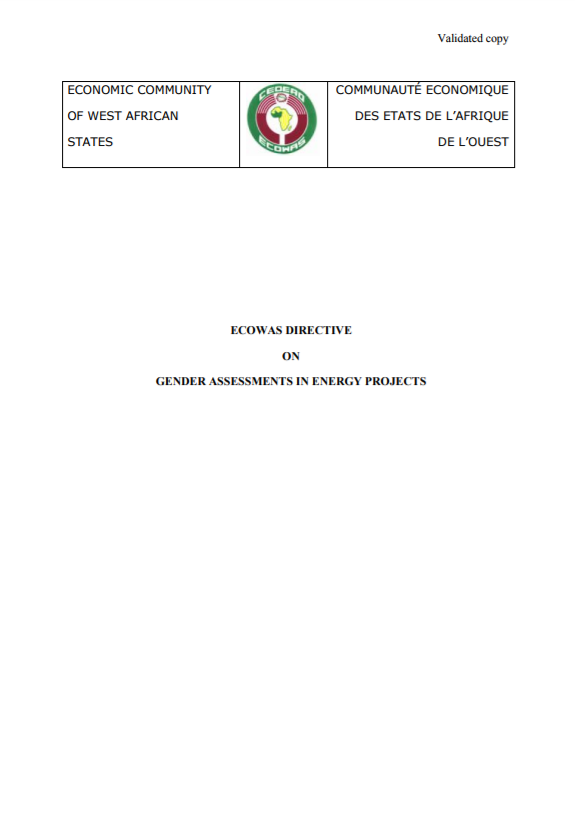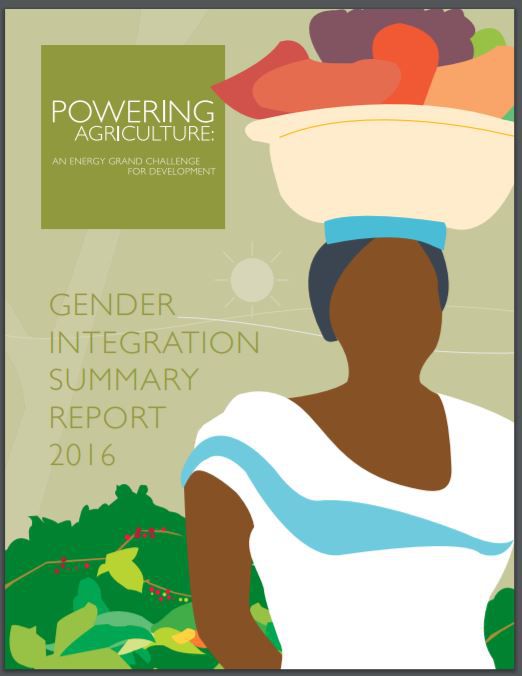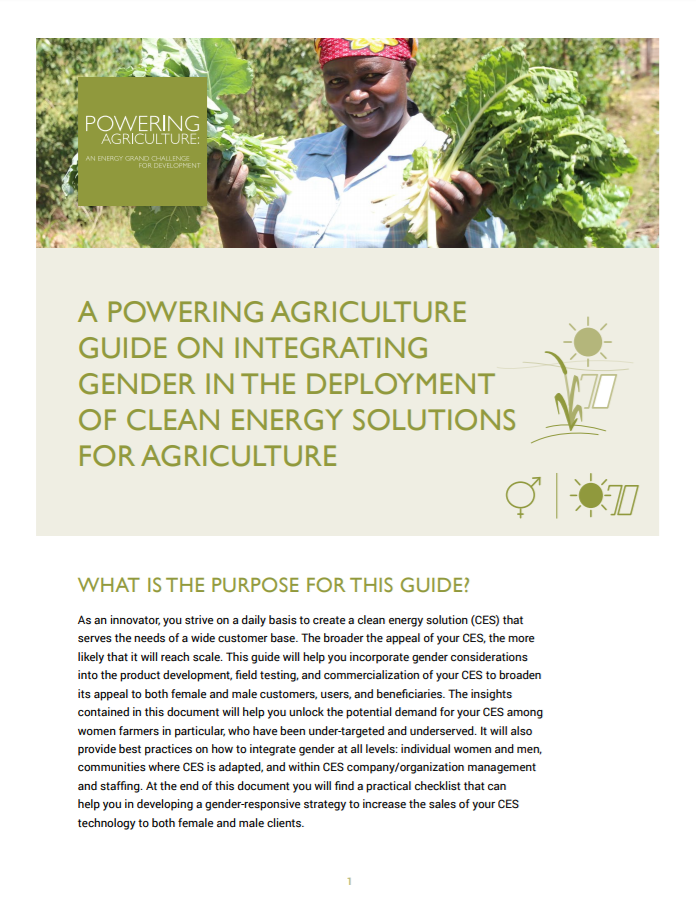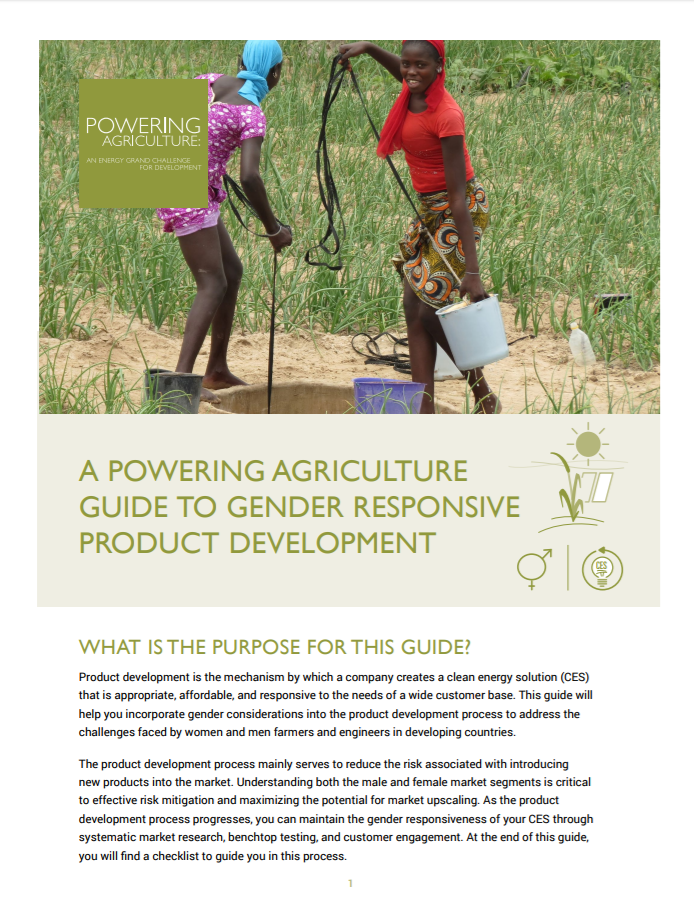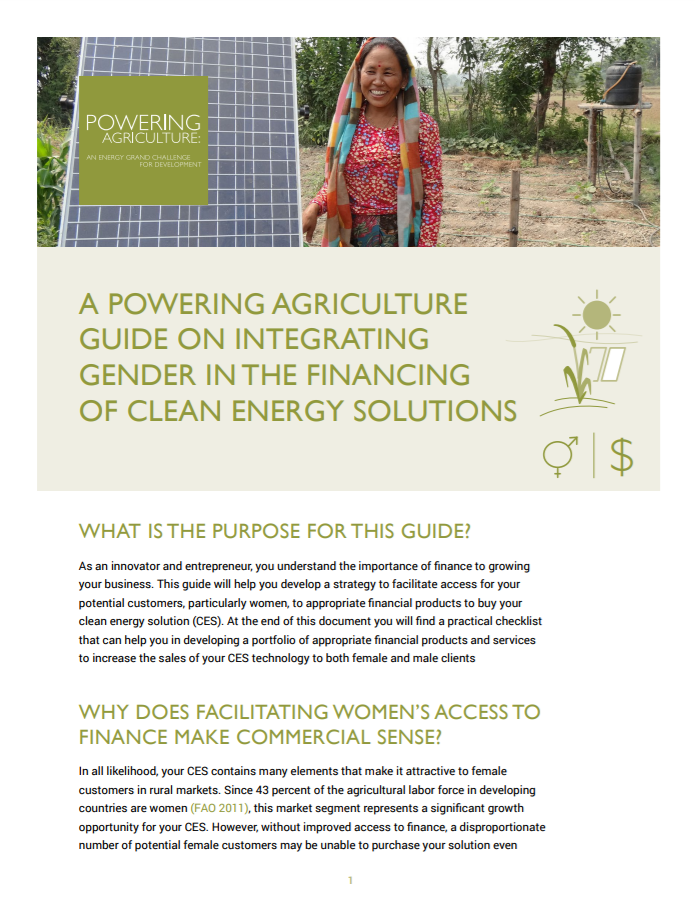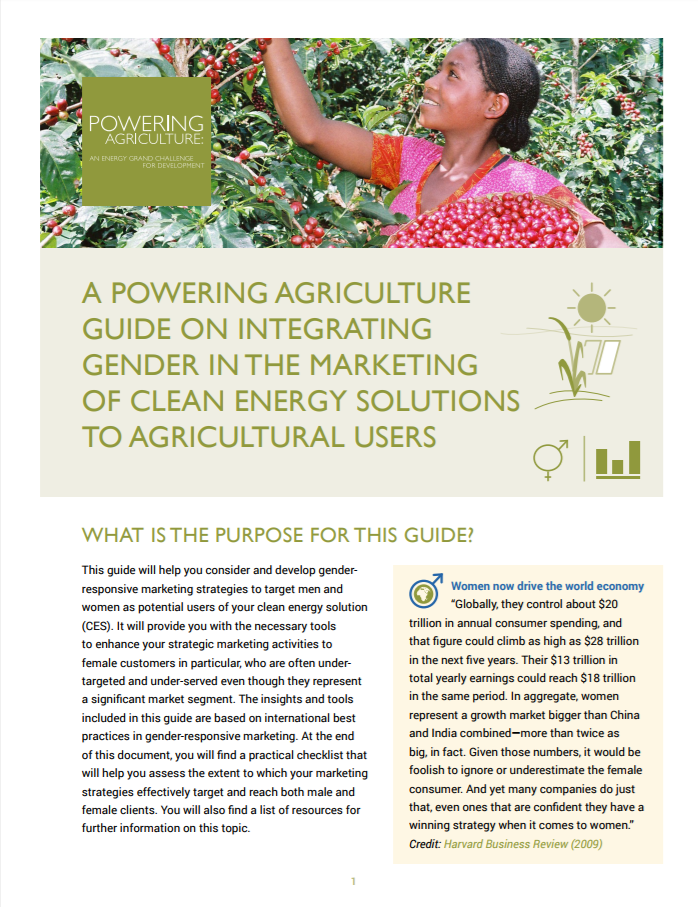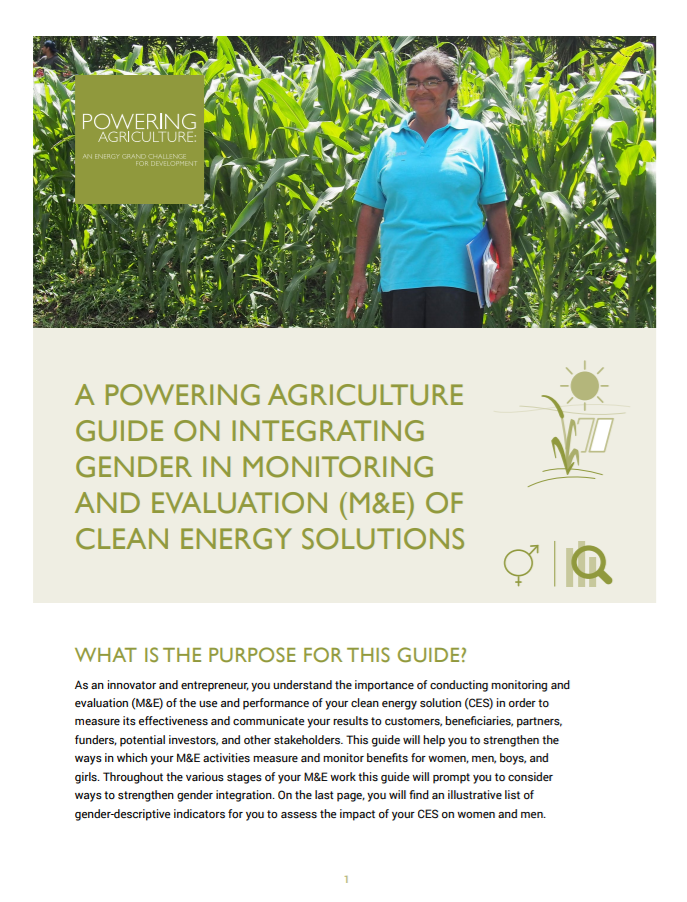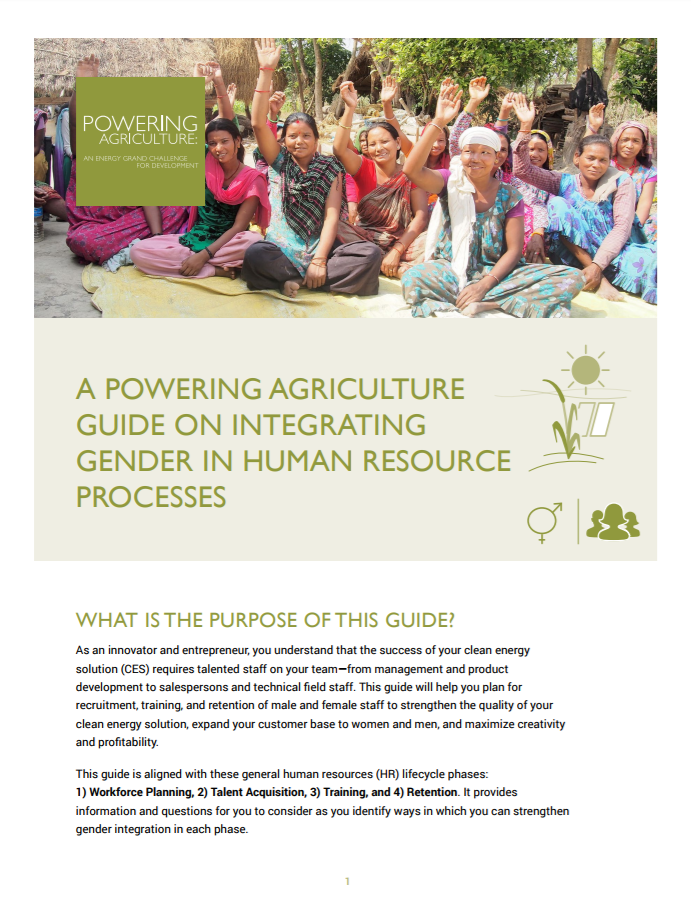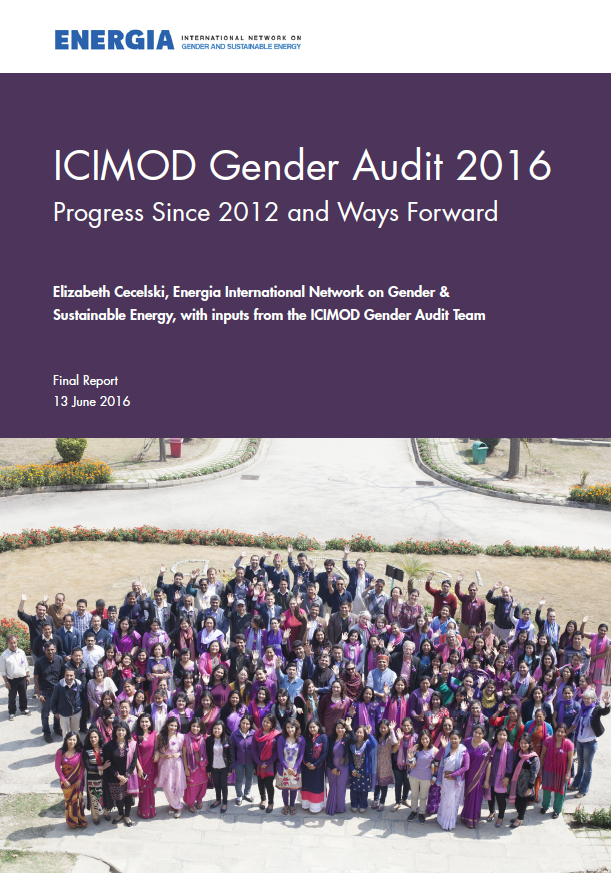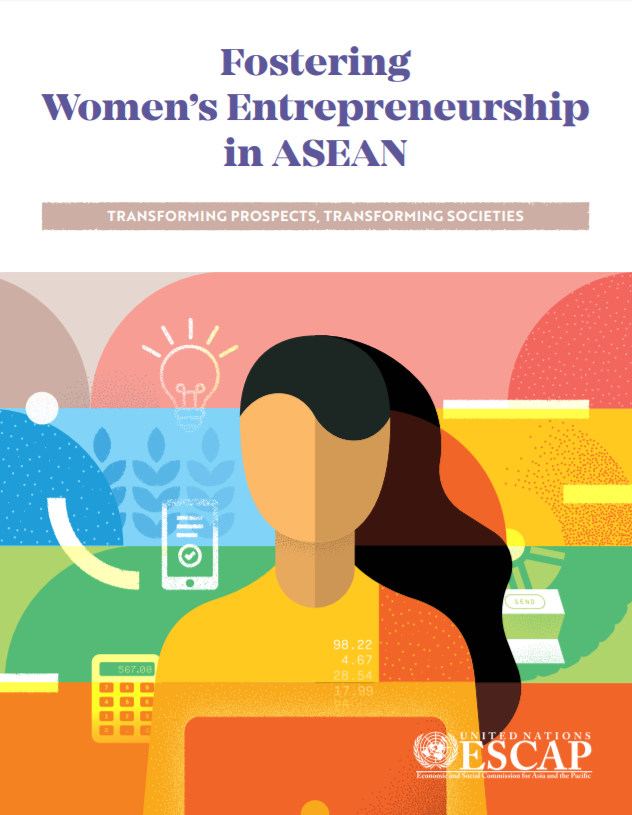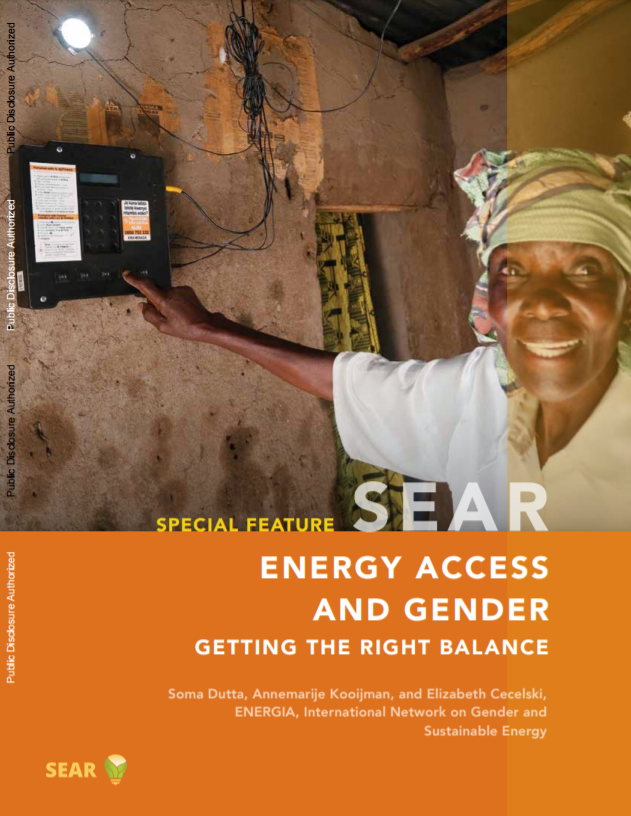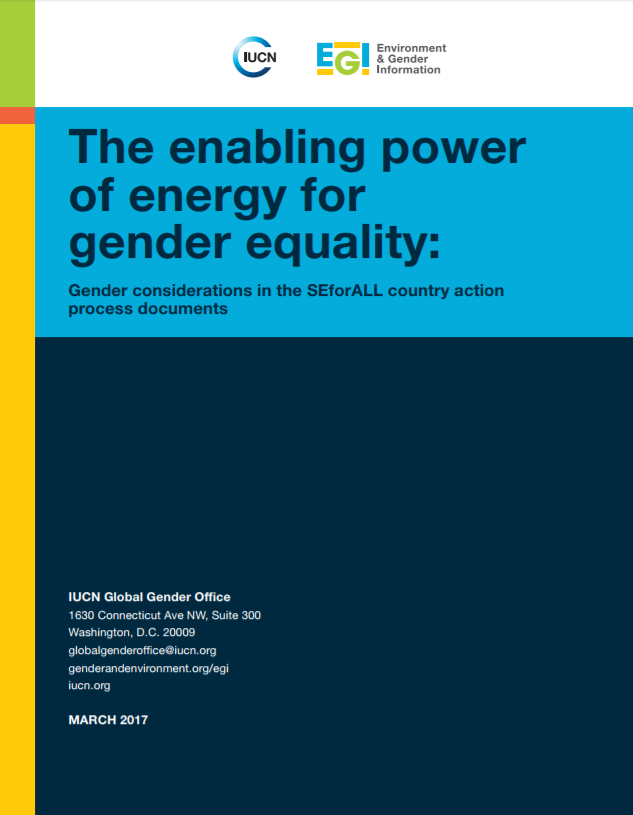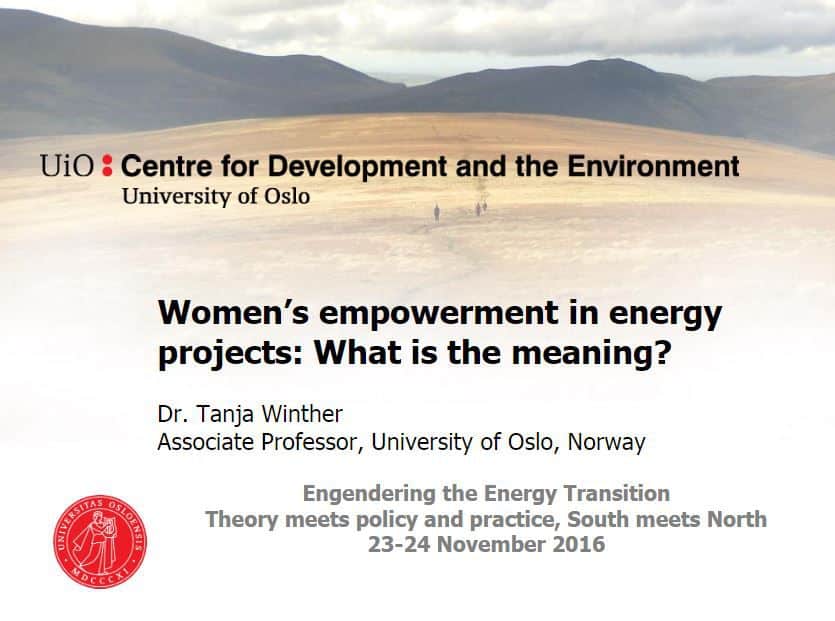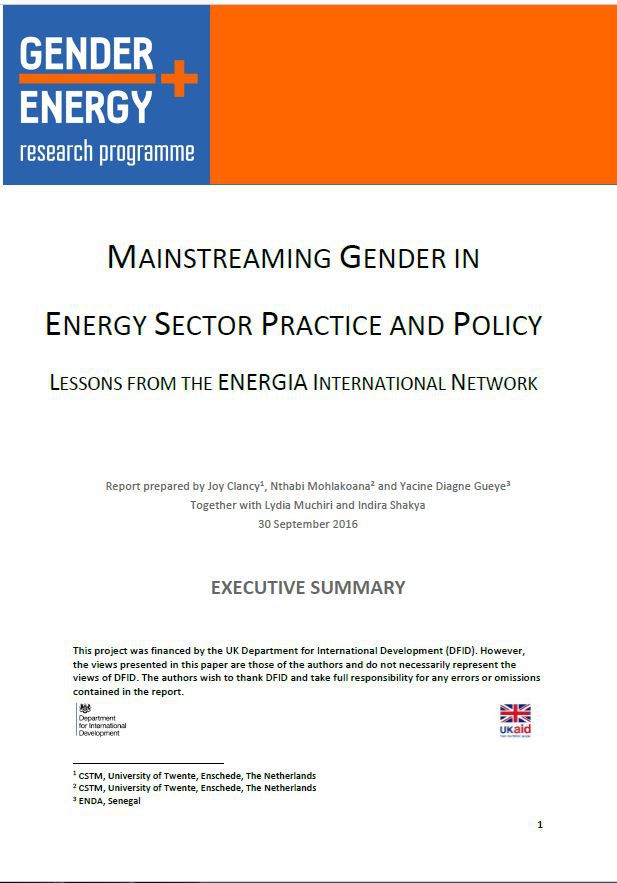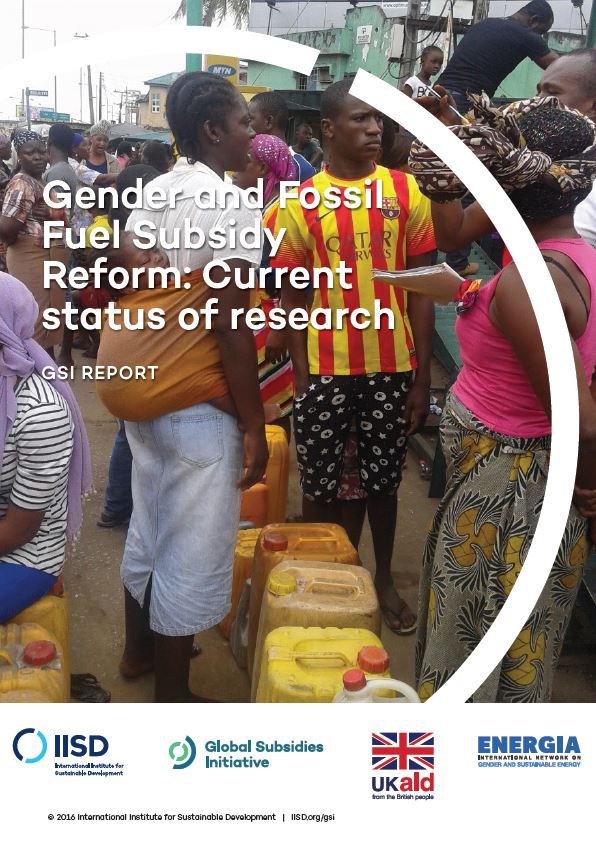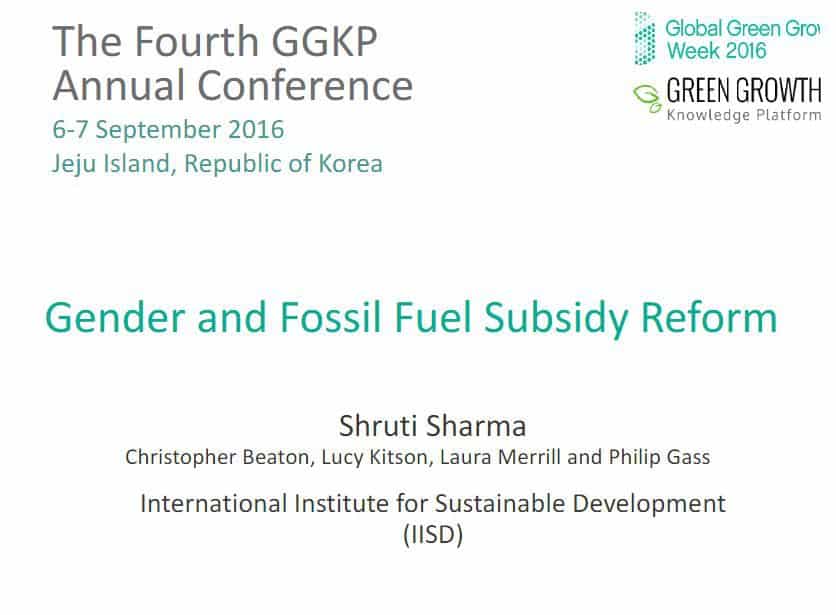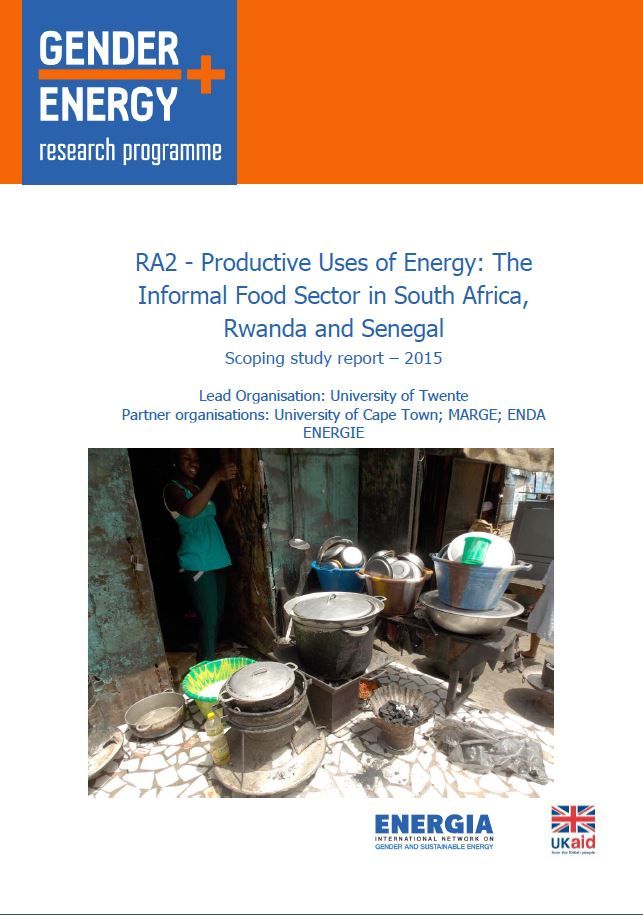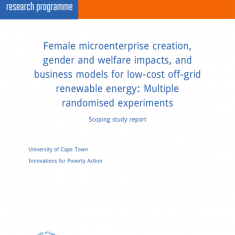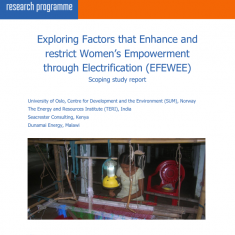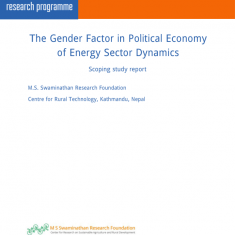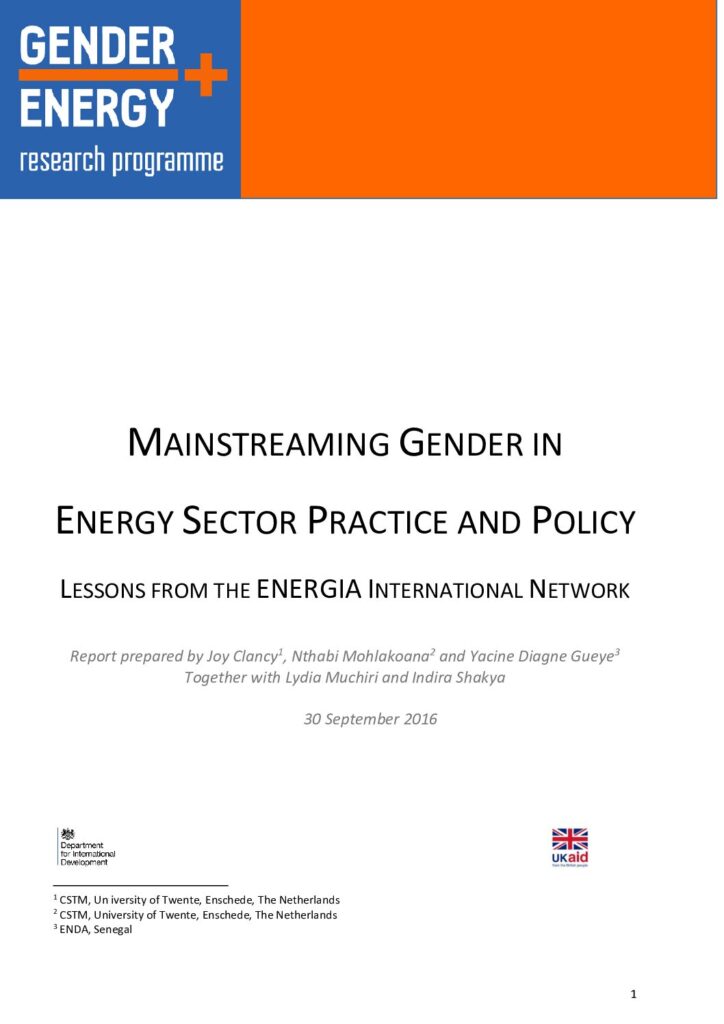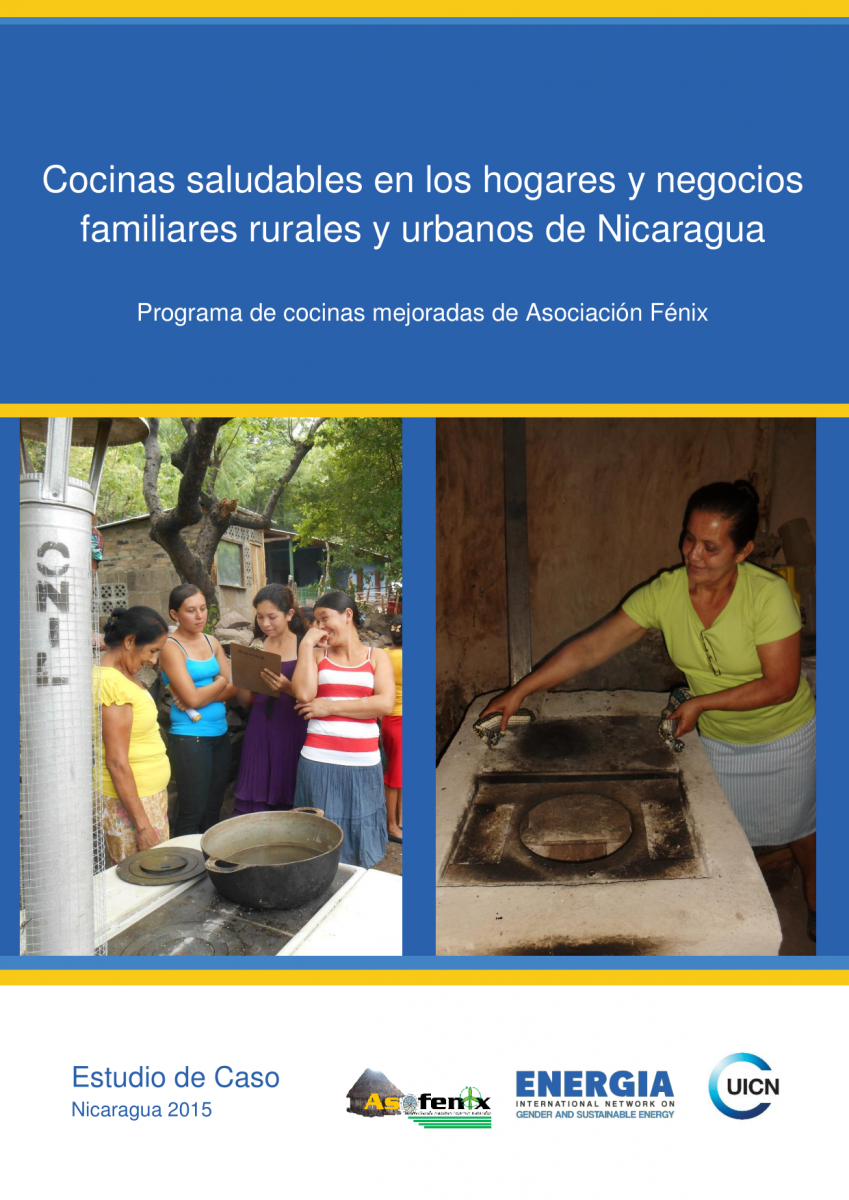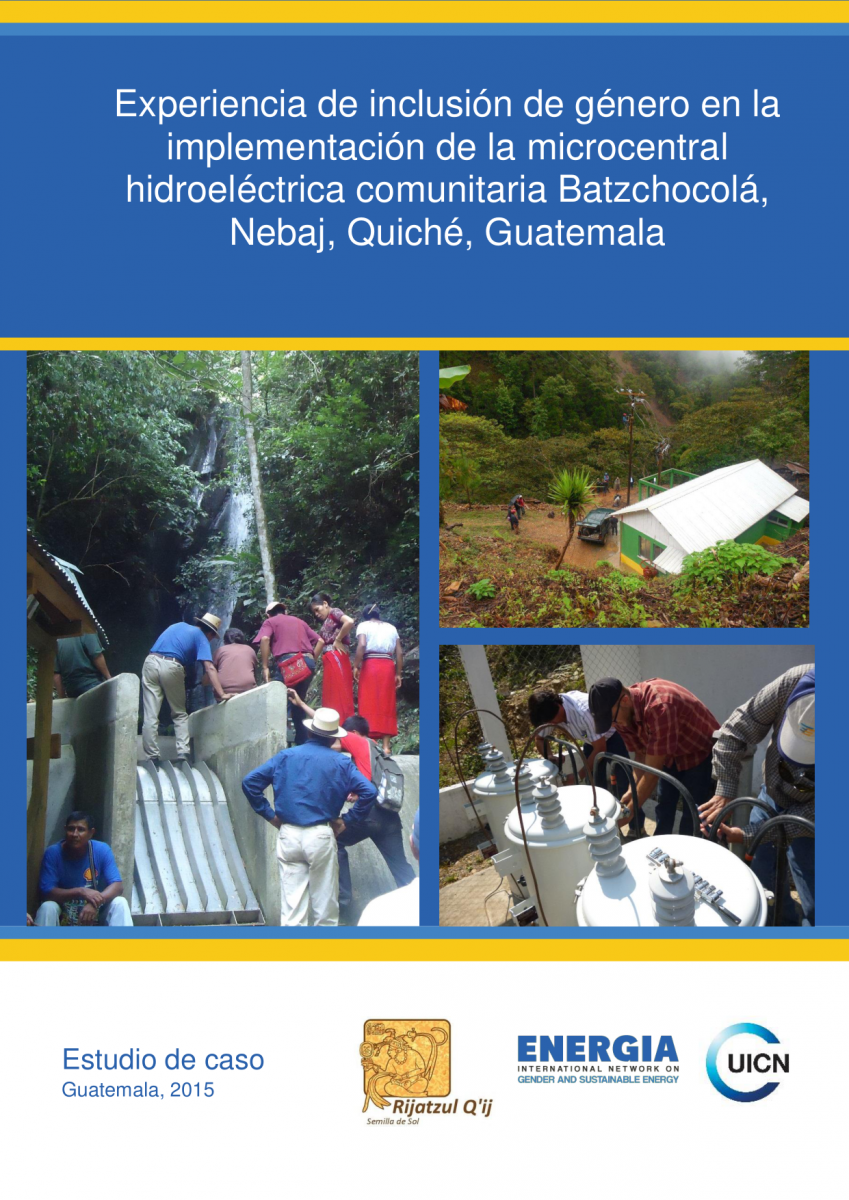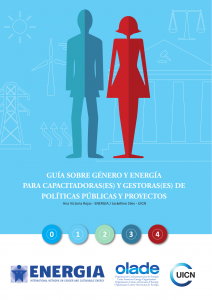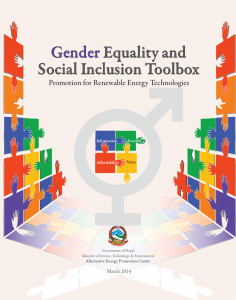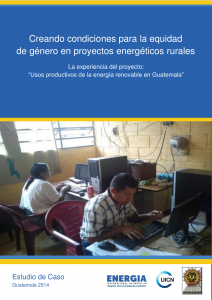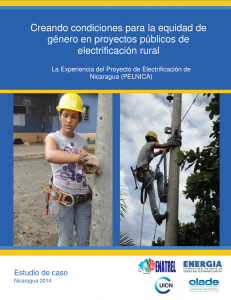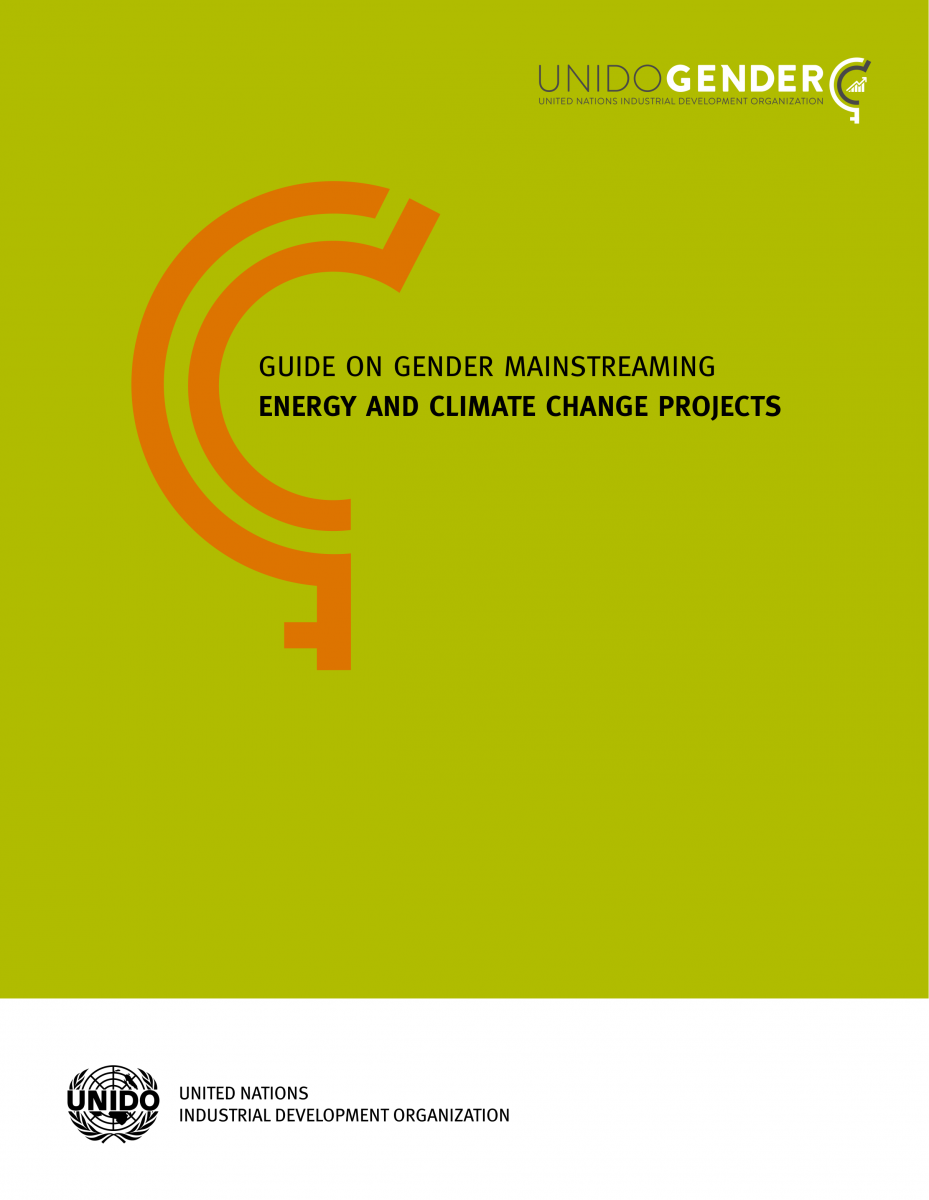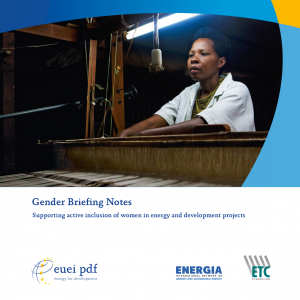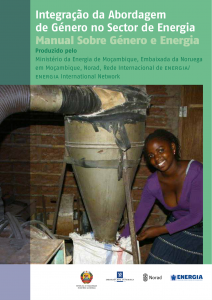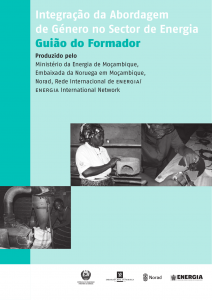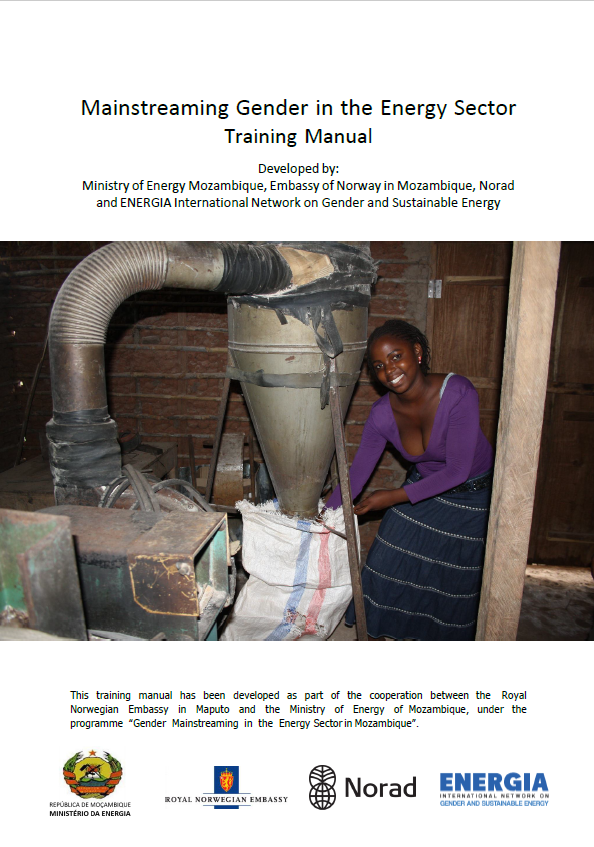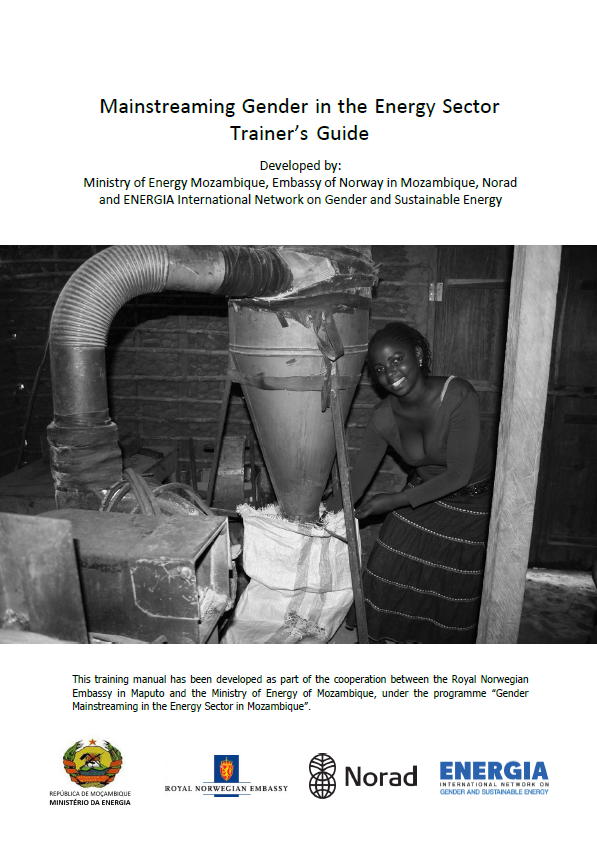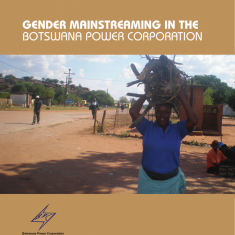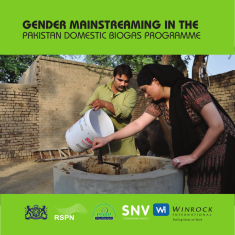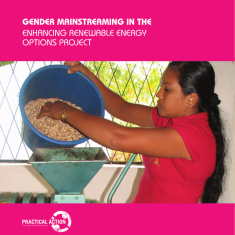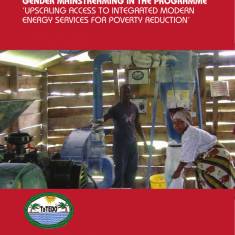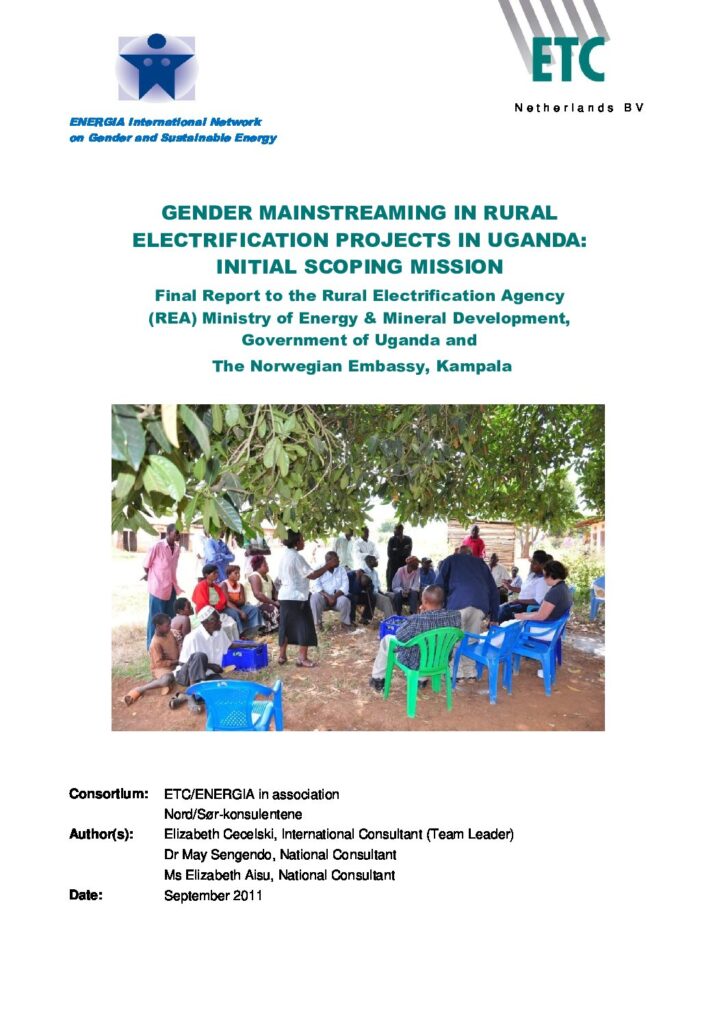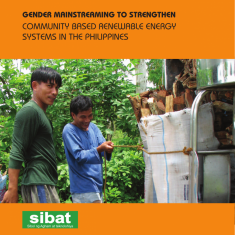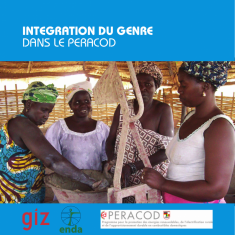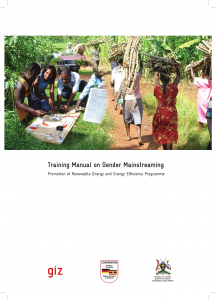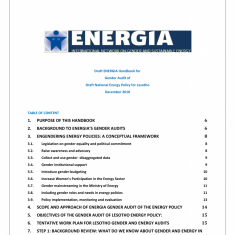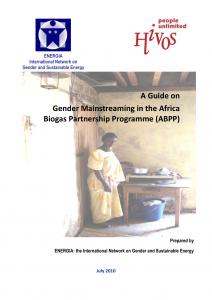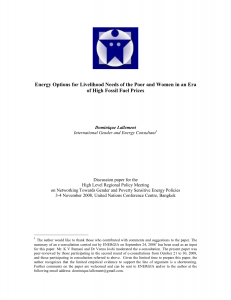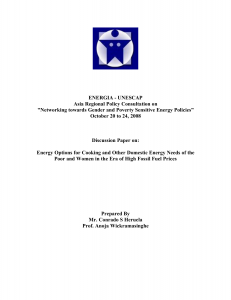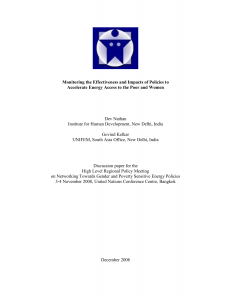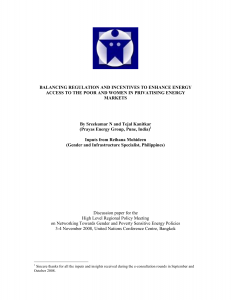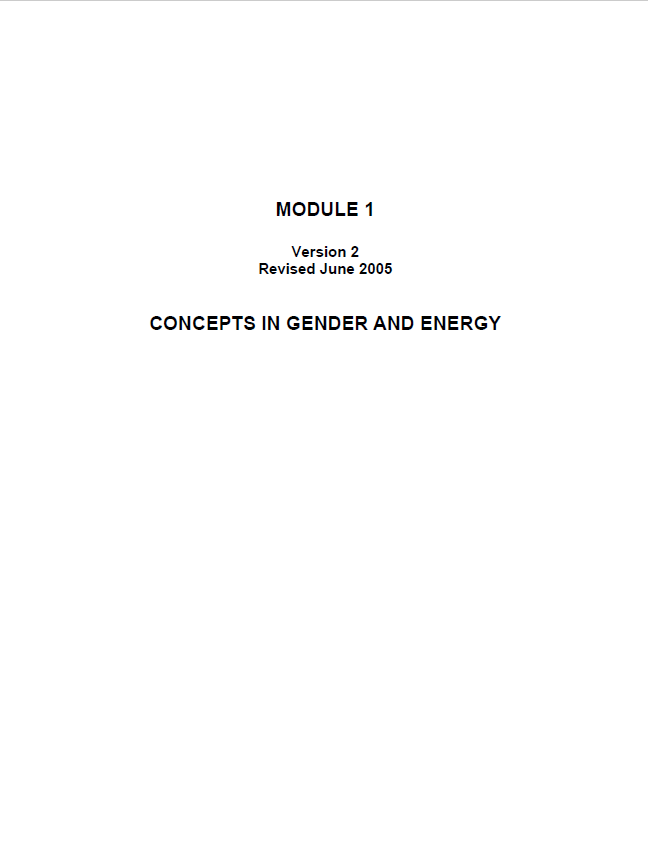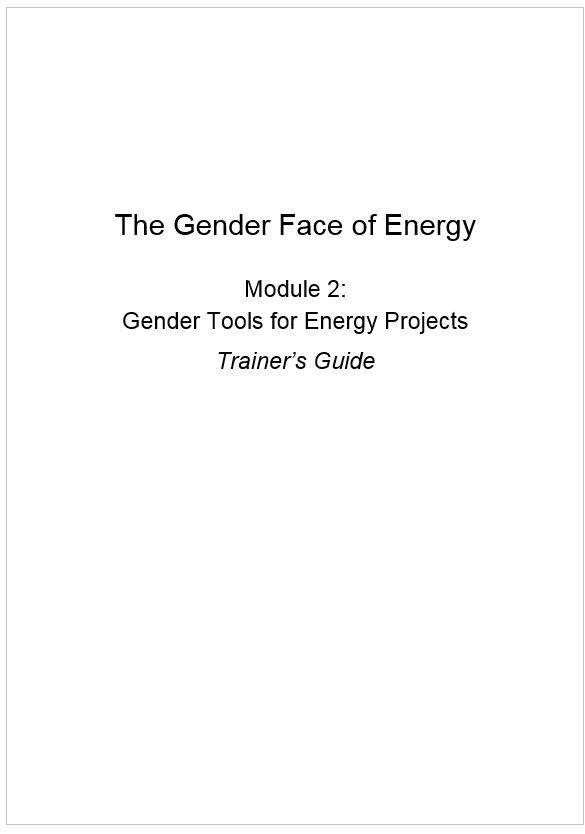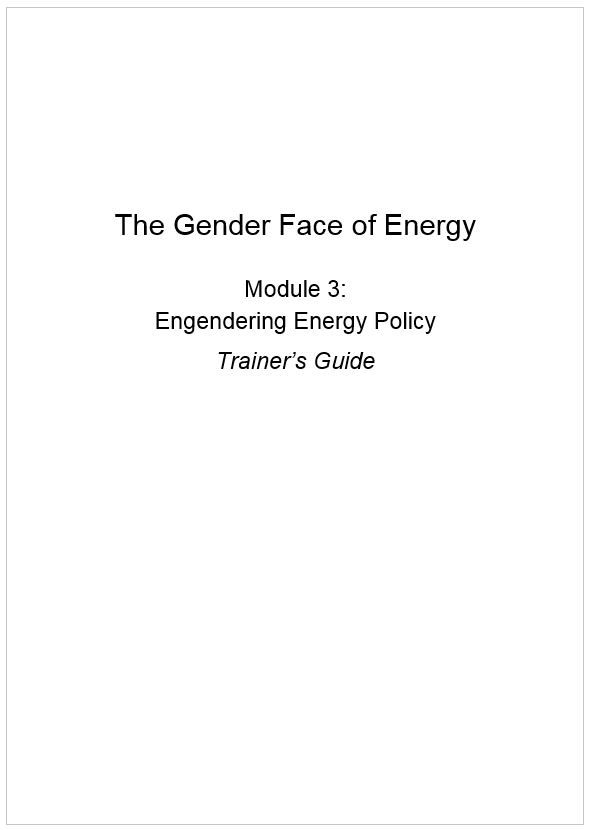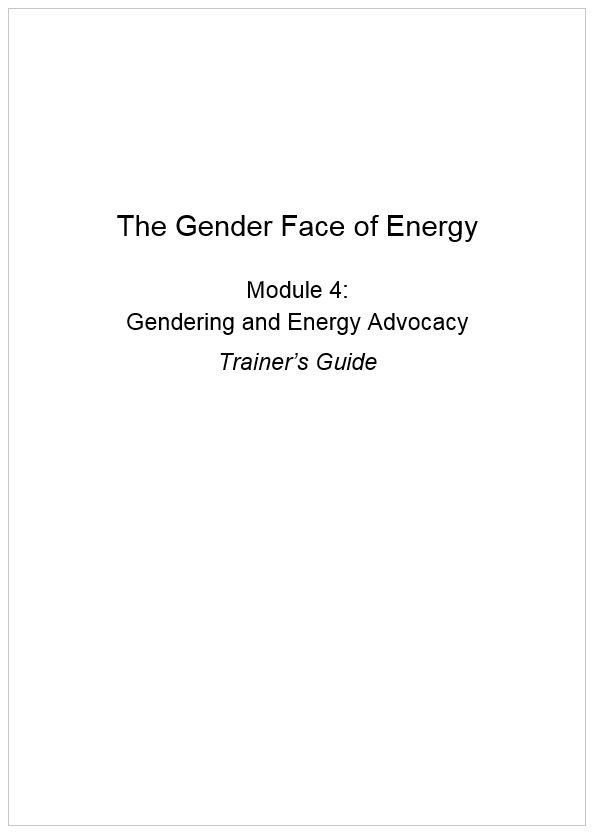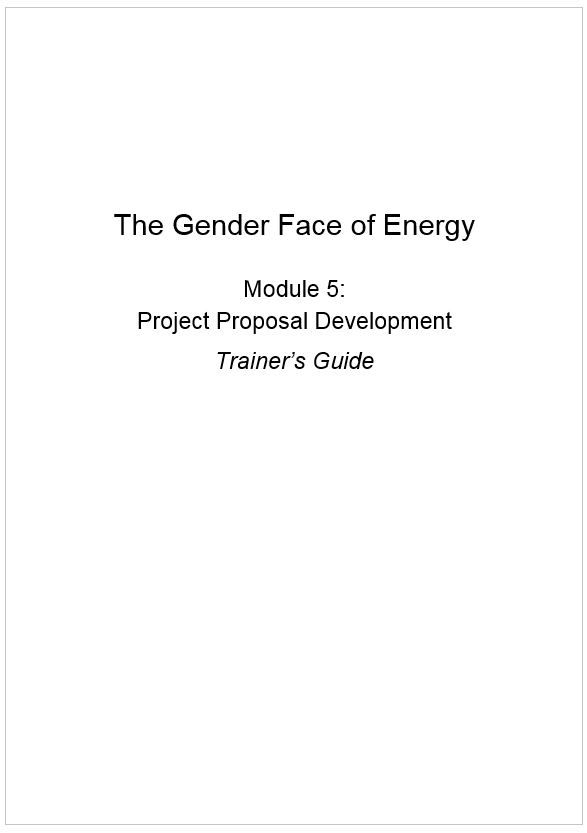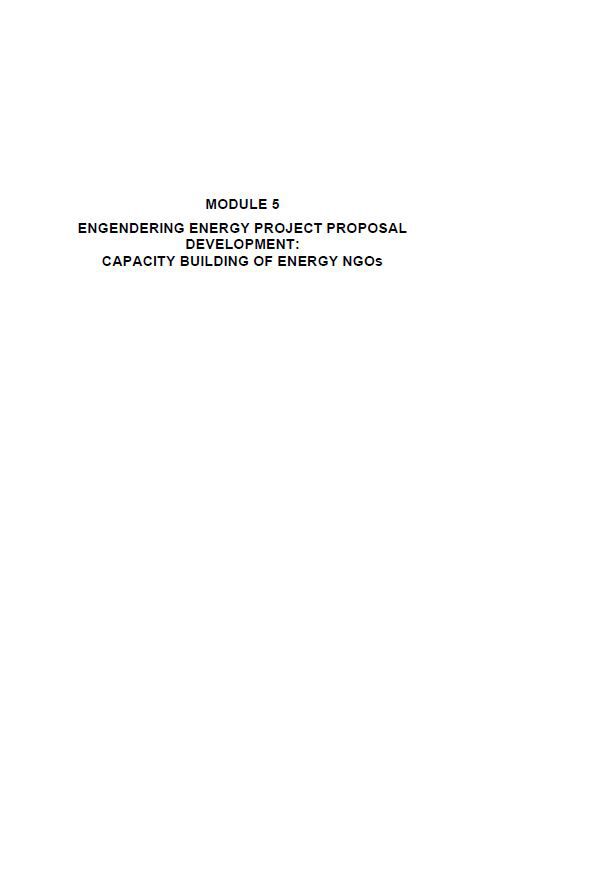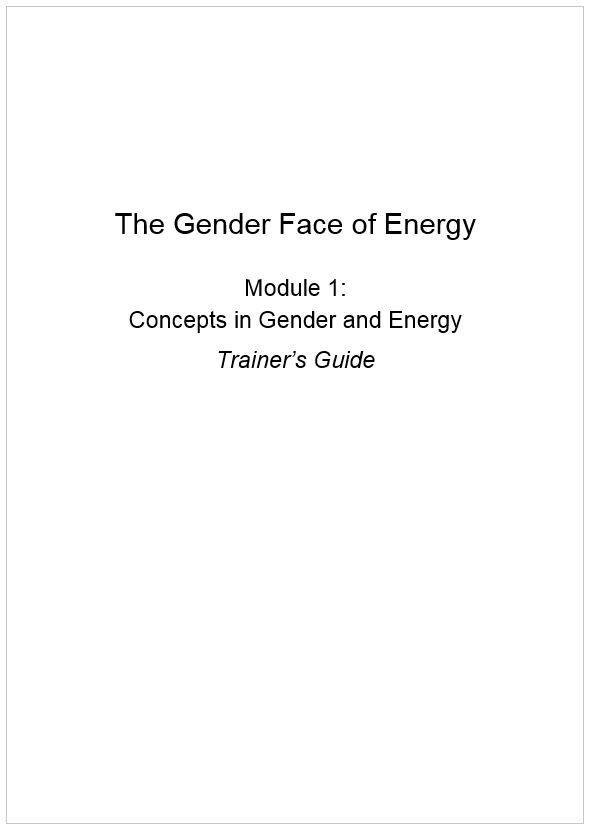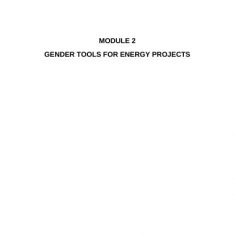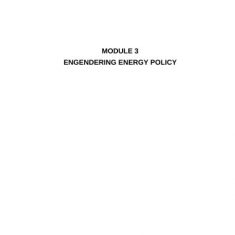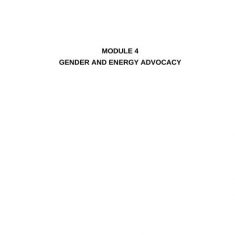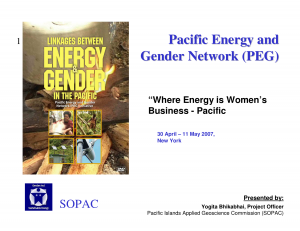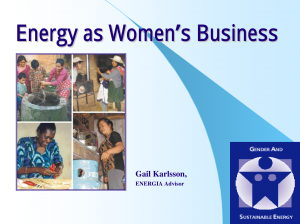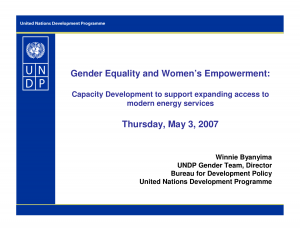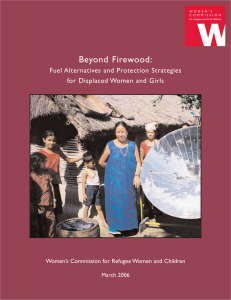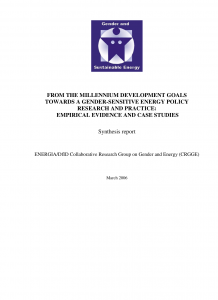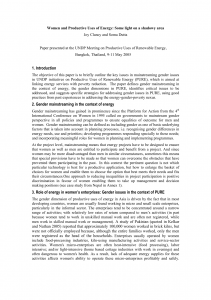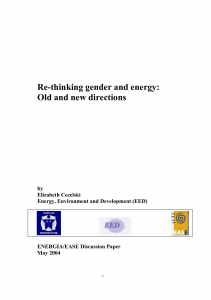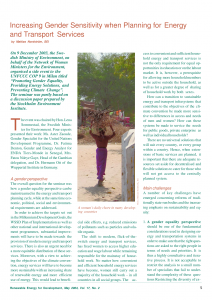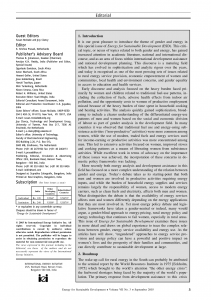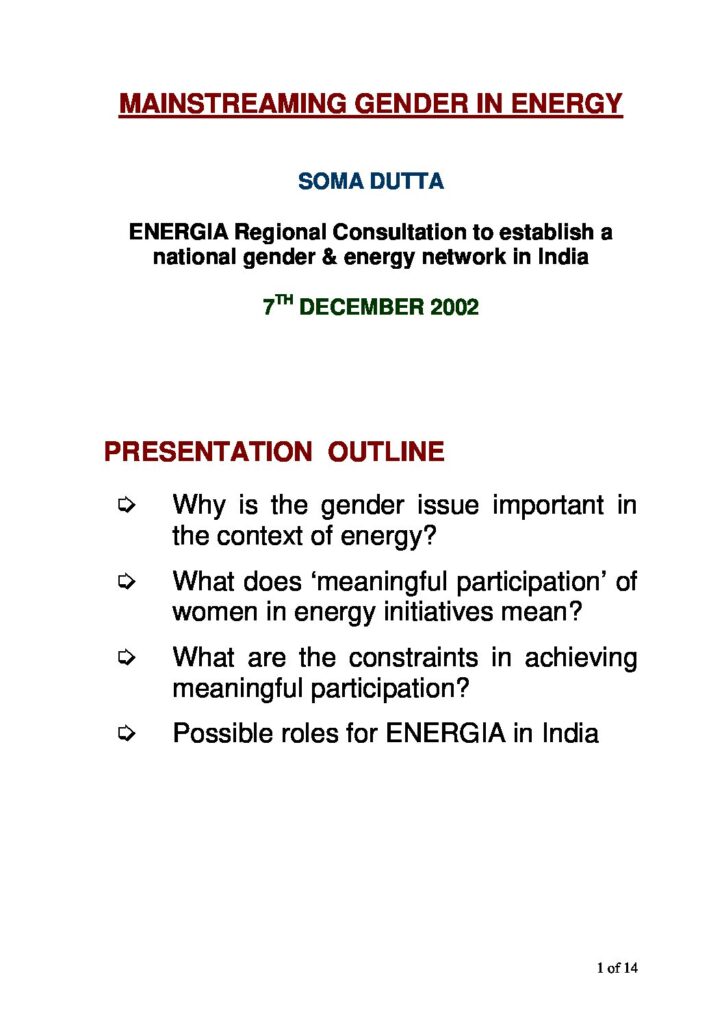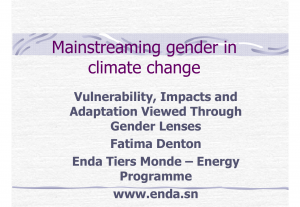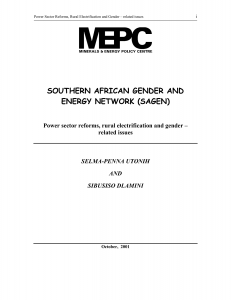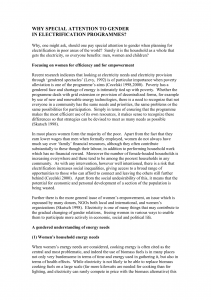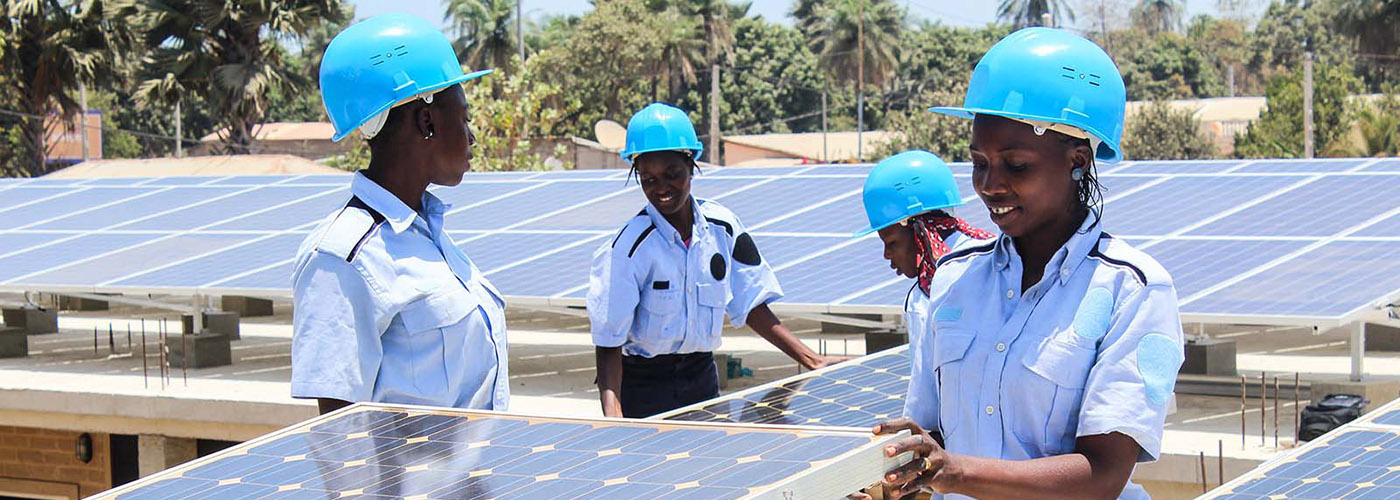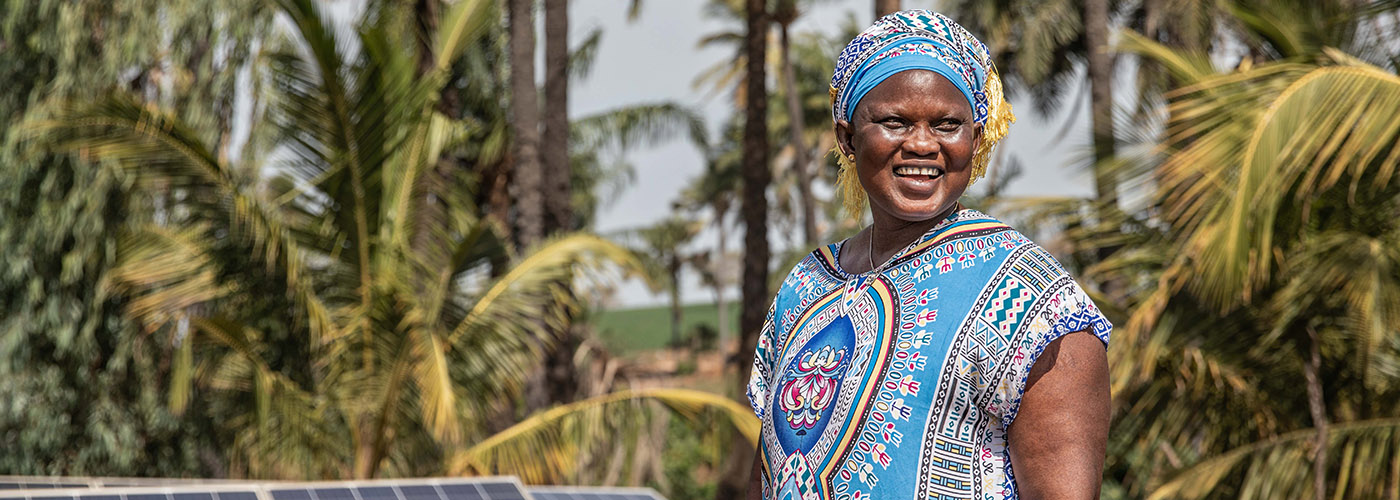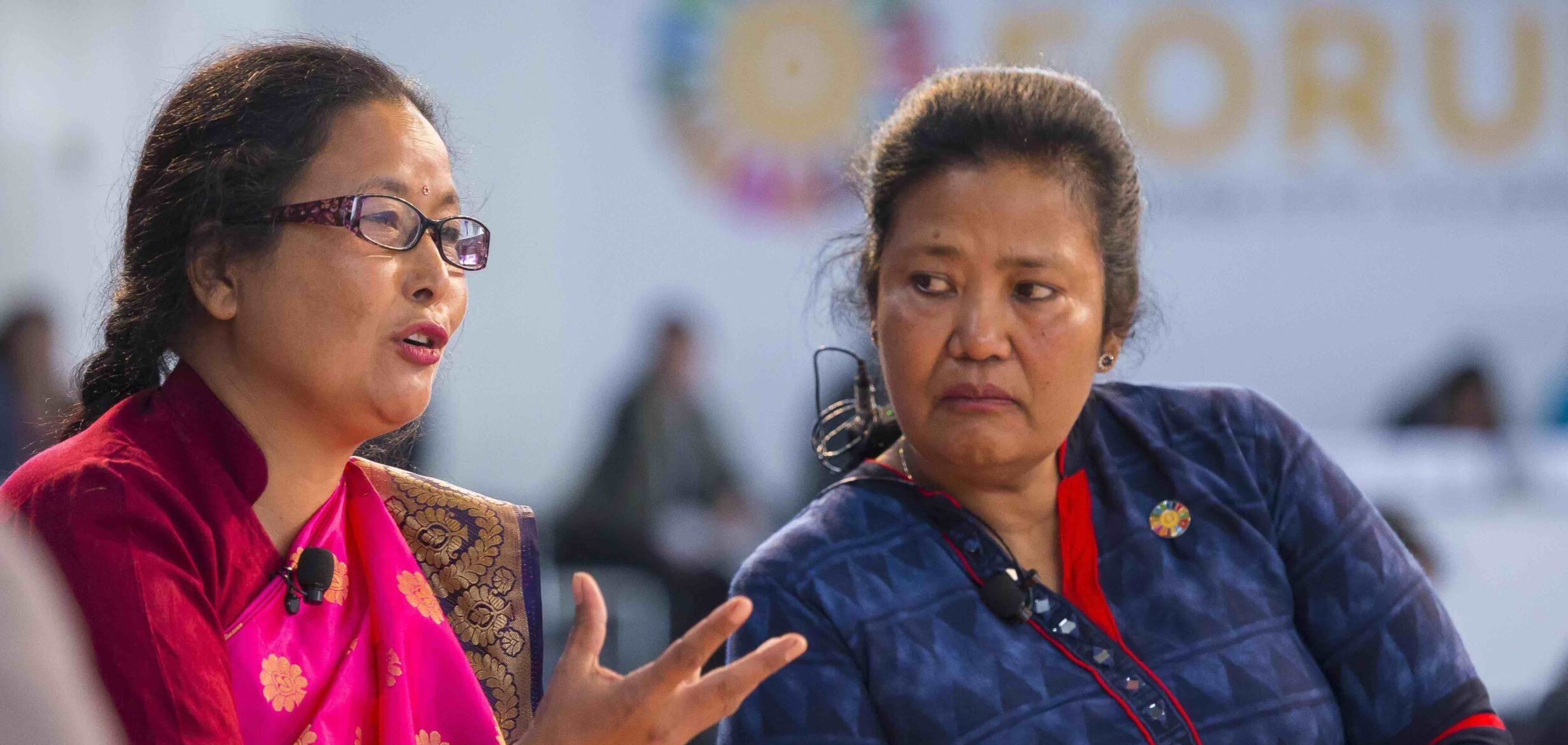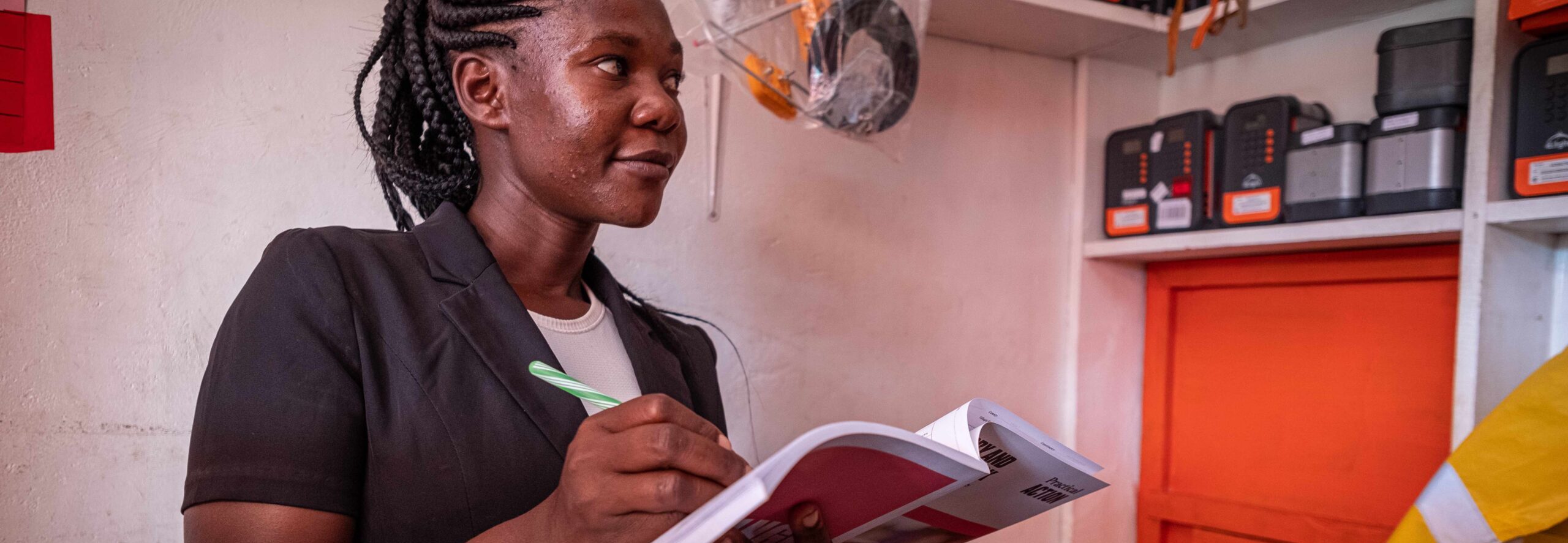Women in Biogas. Survey Analysis Report 2024
This report explores the current state of gender representation in the biogas sector and highlights initiatives and policies needed to enhance female participation and leadership. It explores how women interact with the biogas sector as participants. Specifically, it analyses the progress and current place of women in the biogas industry relative similar industries
Towards Gender Equality and Social Inclusion in Energy Utilities: Approaches, Methods, and Results from Nepal
The project Strengthening the Capacity of the Energy Sector to Deliver Gender Equality and Social Inclusion Results was implemented from January 2019 until December 2021. The project’s ultimate goal was to mainstream gender equality and social inclusion (GESI) in the program and project cycles of the Nepal Electricity Authority (NEA). The NEA is responsible for…
Energy Access and Gender in Ghana: Policy Brief
In the wider West African region, Ghana is often seen as an energy success story with over 80% of the population having access to grid electricity. Yet, 50% of rural areas live without this access while ‘dumsor’ (load shedding) poses an ongoing challenge for those connected. In terms of gender equity, national energy policy recognises…
Energy Access and Gender in India: Policy Brief
The connection between equity in energy access and developmental aspects like poverty reduction, health and wellbeing is today well understood. Responding to this, energy access policies and programmes in India have tried to address gender equity within energy access, but much of this effort has failed to create a transformational impact. Until 2018, 680 million…
Energy Access and Gender in Nigeria: Policy Brief
Understanding the gender dimensions of energy access is essential. Women play important roles in energy system development and their empowerment is crucial in achieving the United Nations Sustainable Development Goals. Indeed, many household tasks (e.g., cooking, water collection, and other domestic chores) are mostly performed by women. Equitable access to energy can reduce the burden…
Energy Access and Gender in Pakistan: Policy Brief
Energy access is inextricably linked to gender equity, a theme that cuts across the United Nation’s 17 Sustainable Development Goals (SDGs) and is imperative to achieve sustainability targets. Yet, energy policies in Pakistan remain ‘gender-blind’, focusing on improving energy access without considering the differential impacts of how men and women access, consume, are affected by,…
Integrating Women into Grameen Shakti’s Renewable Energy Value Chain in Bangladesh: A Study of the Project and Lessons Learned
This assessment report considers gender equality and women’s empowerment in Bangladesh, and covers a study focused on the USAID-funded Rural Empowerment through Renewable Energy project. This 15-day technological training for rural women in Bangladesh helped to integrate women into the Grameen Shakti (or GS, the leading renewable energy company in the country) renewable energy value…
Gender Mainstreaming in Rural Electrification Programmes
Gender mainstreaming in rural electrification projects can identify practical activities that can be undertaken as part of the construction phase or during operations. This technical brief provides guidance on possible gender issues and entry points in rural electrification projects as well as actions that can help ensure equitable access to the benefits of rural electrification…
Gender, Energy Technology and Climate Change
This factsheet, jointly produced by the Women’s Environment and Development Organization (WEDO) and ENERGIA – the International Network on Gender and Sustainable Energy, highlights some of the key gender and energy technology issues related to climate change. The emphasis is on the needs of women in developing countries – many of whom are already dealing…
A Regional Gender Assessment of Energy Policies and Programmes in South Asia Improving gender-inclusive access to clean and renewable energy in Bhutan, Nepal and Sri Lanka
Improving Gender-Inclusive Access to Clean and Renewable Energy in Bhutan, Nepal and Sri Lanka is an Asian Development Bank (ADB)-supported project(JFPR Grant-9158 REG). The project aimed to increase rural poor women’s access to affordable and reliable clean energy sources and technologies in selected project sites in Bhutan, Nepal and Sri Lanka. It was implemented by…
Gender review of national energy policies and programmes in Nepal Improving gender-inclusive access to clean and renewable energy in Bhutan, Nepal and Sri Lanka
Improving gender-inclusive access to clean and renewable energy in Bhutan, Nepal and Sri Lanka is an Asian Development Bank (ADB) supported project (JFPR Grant-9158 REG), being implemented by the ETC Foundation, Netherlands, in association with Centre for Rural Technology (CRT/N) (Nepal country partner). The project aims to increase rural poor women’s access to affordable and…
Gender review of national energy policies and programmes in Nepal Improving gender-inclusive access to clean and renewable energy in Bhutan, Nepal and Sri Lanka
Improving gender-inclusive access to clean and renewable energy in Bhutan, Nepal and Sri Lanka is an Asian Development Bank (ADB) supported project (JFPR Grant-9158 REG), being implemented by the ETC Foundation, Netherlands, in association with Centre for Rural Technology (CRT/N) (Nepal country partner). The project aims to increase rural poor women’s access to affordable and…
Gender review of national energy policies and programmes in Bhutan Improving gender-inclusive access to clean and renewable energy in Bhutan, Nepal and Sri Lanka
The Improving Gender-Inclusive Access to Clean and Renewable Energy in Bhutan, Nepal and Sri Lanka is Asian Development Bank (ADB) supported project (JFPR Grant-9158 REG). The project aims to increase rural poor women’s access to affordable and reliable clean energy sources and technologiesin selected project sites in Bhutan, Nepal and Sri Lanka. This is a…
Gender review of national energy policies and programmes in Bhutan Improving gender-inclusive access to clean and renewable energy in Bhutan, Nepal and Sri Lanka
The Improving Gender-Inclusive Access to Clean and Renewable Energy in Bhutan, Nepal and Sri Lanka is Asian Development Bank (ADB) supported project (JFPR Grant-9158 REG). The project aims to increase rural poor women’s access to affordable and reliable clean energy sources and technologiesin selected project sites in Bhutan, Nepal and Sri Lanka. This is a…
Renewables 2016 Global Status Report
Read more at: http://www.ren21.net/status-of-renewables/global-status-report/ DOWNLOAD
Beyond Connections: Energy Access Redefined
Access to energy is a key enabler of socioeconomic development. Energy is needed for multifarious applications across households, productive uses, and community infrastructure. “Universal access to modern energy by 2030” has been proposed as one of the three key pillars of the Sustainable Energy for All (SE4All) program, an initiative co-chaired by the United Nations…
Gender review of national energy policies and programmes in Sri Lanka Improving gender-inclusive access to clean and renewable energy in Bhutan, Nepal and Sri Lanka
Improving gender-inclusive access to clean and renewable energy in Bhutan, Nepal and Sri Lanka is an Asian Development Bank (ADB) supported project (JFPR Grant-9158 REG). The project aims to increase rural poor women’s access to affordable and reliable clean energy sources and technologies in selected project sites in Bhutan, Nepal and Sri Lanka. This report…
Mainstreaming Gender in Energy Projects
This technical brief is based on ‘Gender Mainstreaming in Energy Projects: A Practical Handbook’, which was prepared by ENERGIA, and which provides guidance and practical tools to assist energy projects in undertaking gender mainstreaming systematically. It draws on experiences from energy projects in Asia and Africa to “demystify” gender mainstreaming in the energy sector, both…
Institutionalising Gender Mainstreaming Processes in Energy Organisations
This technical brief provides guidance to energy organisations interested in adopting such frameworks. It sets out processes and steps for an organisationto follow when incorporating gender concerns into its projects, procedures, work ethic and overall structure. This technical brief is based on ‘Gender Mainstreaming in Energy Projects: A Practical Handbook’, which was prepared by ENERGIA,…
Mainstreaming Gender in Energy Projects: A Practical Handbook
This Handbook on mainstreaming gender in energy projects seeks to provide guidance, practical tools and examples for energy projects that show how to undertake gender mainstreaming systematically. TheHandbook is a product of an ENERGIA initiative on Gender in Energy Projects and is based on ENERGIA’s work on gender mainstreaming since the 1990s, including gender and…
Mainstreaming Gender in Energy Projects: Resource Pack
The Resource Pack is an accompanying document for the Mainstreaming Gender in Energy Projects: A Practical Handbook, developed by ENERGIA. The Resource Pack on mainstreaming gender in energy projects provides practical tools and examples for energy projects that show how to undertake gender mainstreaming systematically. It contains various resources that can be used to mainstream…
Creating Conditions for Gender Equity in Rural Energy Projects: Experience in Productive Uses of Renewable Energy in Guatemala
initiative. “Creating Conditions for Gender Equity in Rural Energy Projects: Experience in Productive Uses of Renewable Energy in Guatemala” has been undertaken by Fundación Solar (Solar Foundation), a private development organization established in Guatemala in 1993. This case study documents the ways in which an energy project, in this case for climate change mitigation, can…
Creating Conditions for Gender Equity in Rural Electrification Projects: Experiences from the Nicaraguan Electrification Project (PELNICA)
“Creating Conditions for Gender Equity in Rural Energy Projects: Experience in the Nicaraguan Electrification Project, PELNICA” highlights the results for gender equality obtained through the PELNICA initiative, and shares some reflections on how this six-year process has been able to influence the design and implementation of other similar projects in Nicaragua, as well as expand…
Experience in Gender Inclusion in the Implementation of the Batzchocolá Community Micro Hydroelectric Plant in Nebaj, Quiché, Guatemala
“Experience in Gender Inclusion in the Implementation of the Batzchocolá Community Micro Hydroelectric Plant in Nebaj, Quiché, Guatemala” highlights the results in terms of gender equality obtained by Semilla de Sol and the Hydroelectric Association for the Integral Development of Northern Quiche (ASHDINQUI), a non-profit social and community venture that began with the construction of…
Integrating Gender Considerations into Energy Operations
In the energy sector, the gender dimensions of access to services, access to benefits, and exposure to risks and benefits, are being increasingly recognized as important elements to be considered for effective policy making and project design. In practice, this translates into integrating a gender perspective throughout the operational cycle to improve gender equity in…
Healthy Stoves in Rural and Urban Homes and Family Businesses in Nicaragua: Asociación Fénix Programme for Improved Stoves
“Healthy stoves in rural homes and family businesses in Nicaragua” shows the results in terms of gender equality obtained by Asociación Fénix, a Nicaraguan non-governmental and non-profit organisation established in 2001 that works to promote renewable energy sources and responsible use of natural resources to reduce climate change. This study describes the process of a…
Sustainable Energy for All Status Report: Tracking Progress in Asia and the Pacific
This report reviews the early work of the AP-SE4All, and the conditions of the developing Asia and Pacific countries it is working with. It charts preliminary progress, and assesses the policy environment which the work to achieve the SE4All targets will operate within. Uniquely, this report highlights the nexus of issues involving women, children, and…
ECOWAS policy for gender mainstreaming in energy access
Countries of the Economic Community of West African States (ECOWAS), represented by the Ministries of Energy, validated on 4-5 June 2015 in Dakar, Senegal, the regional Policy to mainstream gender in all energy programmes, projects and initiatives implemented in the Member States, including large scale energy infrastructure projects and investments. Described as “revolutionary” by the…
Measuring Women’s Economic Empowerment
Design challenges are common to most program evaluations, but this is especially true for programs that measure women’s economic empowerment. This is because of the interdependence between women’s economic and social roles, which influences their business choices and returns to those businesses. For example, because women have significant family responsibilities, they may have different goals…
The Benefits of Gender Balance in Climate Change Mitigation Investments and Sustainable Energy Initiatives
Cleaner fuels, improved efficiency and adoption of renewable energy technologies offer important possibilities for low-carbon economic development and reductions in overall greenhouse gas emissions. These possibilities are especially important for women in developing countries who currently play critical roles in supplying and managing traditional biomass fuels. The UN’s Sustainable Energy for All initiative is highlighting…
ICIMOD Gender Audit 2016
ICIMOD has placed itself at the cutting edge of gender mainstreaming in the Himalaya region, by successfully developing a gender equity policy with strong management support; establishing a high level of gender expertise within the organization; including components, activities and M&E indicators on gender in Regional Programs and the strategic framework; developing many good practices…
Fostering women’s entrepreneurship in ASEAN
In its recent publication “Fostering Women’s Entrepreneurship in ASEAN: Transforming Prospects, Transforming Societies” the United Nations Economic and Social Commission for Asia and the Pacific (ESCAP) proposes critical actions that can be taken by ASEAN Governments to address the particular constraints facing women entrepreneurs. Those actions are foreseen to be taken in conjunction with other…
The enabling power of energy for gender equality: Gender considerations in the SEforALL country action process documents
This assessment aims to identify and understand the degree to which gender considerations are addressed in the three types of documents prepared as part of the SEforALL country action process: rapid assessment and gap analyses (RAGAs), action agendas (AAs) and investment prospectuses (IPs). Findings offer insights into the ways that governments recognize gender considerations in…
Mainstreaming gender in energy sector policy and practice_EXECUTIVE SUMMARY
The ENERGIA network has for more than twenty years been building a substantial body of experience with approaches to gender mainstreaming in the energy sector. There is a need to document this experience in a systematic way that can be used to inform future work of ENERGIA, the network members and partners, and most importantly,…
Gender and Fossil Fuel Subsidy Reform: Current Status of Research
This research project aims to investigate the impacts from fossil fuel subsidy reform on poor women in Bangladesh, India and Nigeria. This initial scoping report finds no primary, quantitative research on the question of the gender-differentiated impact of fossil fuel subsidy reforms. However, there is a large body of literature linked to energy access and…
Productive uses of energy: The informal food sector in South Africa, Rwanda and Senegal
This report represents the Scoping Phase (Phase 1) of Research Area 2 – Productive uses of Energy – of ENERGIA’s Gender and Energy Research Programme. This Research Area applies a gender perspective to explore: (i) the energy sources used by micro and small enterprises in the informal food sector; (ii) the changes that may be…
Female microenterprise creation, gender and welfare impacts, and business models for low-cost off-grid renewable energy: Multiple randomised experiments
Globally, 1.3 billion are without modern power, and grid expansion is not expected to keep pace with population growth. The viability of most enterprises for renewable lighting has been severely limited by pricing of products and financing mechanisms available. Behavioural aspects such as inconvenience associated with use represent further barriers to uptake and use of…
Exploring Factors that Enhance and restrict Women’s Empowerment through Electrification (EFEWEE) – Scoping study report
The overall objective of this independent research project is to examine how policy and practice may enhance women’s empowerment though electrification in rural areas in the South. We consider women’s empowerment as a process towards gender equality, hence a concept that requires analytic attention to women, men, girls and boys. We divide the work into…
The Gender Factor in Political Economy of Energy Sector Dynamics – Scoping study report
This research proposal is based on the premise that it is necessary to include gender concerns in the political economy of energy access. In addition to a structural analysis of power in conventional concerns of political economy, we underscore the need for a gender analysis of political and economic processes to understand the strategic energy…
Mainstreaming gender in energy sector practice and policy lessons from the ENERGIA International Network
The commissioned research focused on using evidence from ENERGIA’s experience with gender approaches to build insights for future implementation and to inform policy and practice according to the Theory of Change as presented by UK’s Department for International Development (DFID). These approaches have been widely used by ENERGIA through a range of projects and programmes…
Cocinas saludables en los hogares y negocios familiares rurales y urbanos de Nicaragua Programa de cocinas mejoradas de Asociación Fénix
El presente documento es el tercero de una serie de cuatro estudios de caso que se llevarán a cabo en Centroamérica bajo esta iniciativa. “Cocinas saludables en los hogares y negocios familiares rurales y urbanos de Nicaragua” destaca los resultados en términos de igualdad de género obtenidos por la Asociación Fénix, una organización no-gubernamental y…
Experiencia de inclusión de género en la implementación de la microcentral hidroeléctrica comunitaria Batzchocolá, Nebaj, Quiché, Guatemala
El presente documento es el tercero de una serie de cuatro estudios de caso que se llevarán a cabo en Centroamérica bajo esta iniciativa. “Experiencia de inclusión de género en la implementación de la microcentral hidroeléctrica comunitaria Batzchocolá, Nebaj, Quiché, Guatemala” destaca los resultados en términos de igualdad de género obtenidos por la Semilla de…
Guía Sobre Género y Energía Para Capacitadoras(es) y Gestoras(es) de Políticas Públicas y Proyectos
La guía es una compilación de materiales y documentos previamente producidos por otras fuentes, que recoge la experiencia de las organizaciones vinculadas con las redes de género y energía de Nicaragua, Honduras, El Salvador, Guatemala, la plataforma virtual de Género y Energía de OLADE, algunas instancias gubernamentales del sector energético de Nicaragua y Uruguay, la…
Gender Equality and Social Inclusion Toolbox – Promotion for Renewable Energy Technologies
The concept of Gender Equality and Social Inclusion (GESI) is the new for the AEPC/NRREP and related stakeholders working for it. Unless the professional working in renewable energy sector has clear understanding on GESI, the target set by the program would not be materialised. The professional working at community level, district to center level must…
Creando Condiciones para la Equidad de Género en proyectos Energéticos Rurales Estudio de Caso Guatemala 2014 La experiencia del proyecto: Usos Productivos de la Energía Renovable en Guatemala
This study examines the benefits that can be derived through gender mainstreaming in sustainable energy projects, specifically looking at the case for PURE in Guatemala. Attention is given to activities that boost women’s participation in decision making and non-traditional roles. DOWNLOAD
Creando condiciones para la equidad de género en proyectos públicos de electrificación rural La Experiencia del Proyecto de Electrificación de Nicaragua (PELNICA)
This study examines the benefits that can be derived through gender mainstreaming in sustainable energy projects, specifically looking at the case for PURE in Nicaragua. Attention is given to activities that boost women’s participation in decision making and non-traditional roles. DOWNLOAD
Guide on Gender Mainstreaming in Energy and Climate Change Projects
This Guide aims at “demystifying” gender mainstreaming and providing practical guidance on how to systematically address gender inequalities specifc toUNIDO’s energy and climate change interventions. Gender equality is a goal in its own right, but it is also vital to the achievement of other development goals, such as poverty reduction and environmental sustainability. To ensure…
Gender Briefing Notes: Supporting active inclusion of women in energy and development projects
This brochure has been developed to assist EUEI PDF partners, consultants and energy practitioners to ensure equal benefits for men and women in development projects in the energy sector, as well as to ensure a gender sensitive approach in ongoing and future interventions. The Briefing Notes will provide the reader with gender dimensions of the…
Gender Mainstreaming in the Botswana Power Corporation
Mainstreaming Gender in Energy Projects Knowledge Products In 2007 ENERGIA started with its strategy to mainstream gender in energy projects. We worked with seven energy projects on gender mainstreaming. The projects varied from rural electrification programs to biogas to cook stove projects. Some were household energy projects, others also had a strong focus on energy…
Gender Mainstreaming in the Pakistan Domestic Biogas Programme
Mainstreaming Gender in Energy Projects Knowledge Products In 2007 ENERGIA started with its strategy to mainstream gender in energy projects. We worked with seven energy projects on gender mainstreaming. The projects varied from rural electrification programs to biogas to cook stove projects. Some were household energy projects, others also had a strong focus on energy…
Gender Mainstreaming in the Enhancing Renewable Energy Options Project, Sri Lanka
Mainstreaming Gender in Energy Projects Knowledge Products In 2007 ENERGIA started with its strategy to mainstream gender in energy projects. We worked with seven energy projects on gender mainstreaming. The projects varied from rural electrification programs to biogas to cook stove projects. Some were household energy projects, others also had a strong focus on energy…
Gender Mainstreaming in the UAIMES-PR Programme, Tanzania
Mainstreaming Gender in Energy Projects Knowledge Products In 2007 ENERGIA started with its strategy to mainstream gender in energy projects. We worked with seven energy projects on gender mainstreaming. The projects varied from rural electrification programs to biogas to cook stove projects. Some were household energy projects, others also had a strong focus on energy…
Gender mainstreaming in rural electrification projects in Uganda: Initial scoping mission
The Rural Electrification Agency (REA), Ministry of Energy and Mineral Development, is guided by a number of key Ugandan development policy objectives as well as energy policy including a mandate to mainstream gender, with the long-term objective of eliminating gender inequalities. REA has recognized gender concerns in some of its activities, and is seeking to…
Gender Mainstreaming to Strengthen Community Based Renewable Energy Systems in the Philippines
Mainstreaming Gender in Energy Projects Knowledge Products In 2007 ENERGIA started with its strategy to mainstream gender in energy projects. We worked with seven energy projects on gender mainstreaming. The projects varied from rural electrification programs to biogas to cook stove projects. Some were household energy projects, others also had a strong focus on energy…
Integration du Genre dans le PERACOD, Senegal [in French]
Mainstreaming Gender in Energy Projects Knowledge Products In 2007 ENERGIA started with its strategy to mainstream gender in energy projects. We worked with seven energy projects on gender mainstreaming. The projects varied from rural electrification programs to biogas to cook stove projects. Some were household energy projects, others also had a strong focus on energy…
Training Manual on Gender Mainstreaming, Promotion of Renewable Energy and Energy Efficiency Programme
Mainstreaming gender issues within the core business under the Human Rights-based approach (HRB-approach) involves acknowledging that human beings are both, on the one hand, individuals, but also members of particular groups or categories. For that reason, fundamental to gender mainstreaming is the belief that all human beings are entitled to enjoy the basic human right…
ENERGIA Handbook for Gender Audit of Draft National Energy Policy for Lesotho
This handbook is intended as working guide on “how to” conduct the gender audit for the Lesotho draft National Energy Policy. Its intended users and authors are the national gender audit team and the ENERGIA technical advisor. The handbook provides a process, methods and tools that identifies and analyzes factors that hinder efforts to mainstream…
A Guide on Gender Mainstreaming in the Africa Biogas Partnership Programme (ABPP)
This Gender Mainstreaming (GM) Guide has been developed by ENERGIA, the International network on Gender and Sustainable Energy, as preparation for the Workshop on Gender Mainstreaming in ABPP, to be held in Nairobi on 18-19th May, 2010.The draft was discussed at the workshop, and additional inputs incorporated in the final version. The Gender Mainstreaming Guide…
Biofuels for Sustainable Rural Development and Empowerment of Women
This book of case studies represents a collaborative effort to explore the potential of biofuels to provide sustainable livelihoods and local sources of energy for people in rural areas of developing countries, with a special emphasis on women. Although there are many forms of bio-energy that can be useful in this regard, our focus in…
Energy Options for Livelihood Needs of the Poor and Women in an Era of High Fossil Fuel Prices
The paper includes three sections. The first section provides information on the context of high and volatile fuel prices and some economic impacts with the objective of establishing a common understanding and relevance of this context. It also reviews some of the government policy responses. The second section provides information on the poverty impact of…
Energy Options for Cooking and Other Domestic Energy Needs of the Poor and Women in the Era of High Fossil Fuel Prices
In the present era of volatile and uncertain fossil fuel prices, which may be prolonged, the prospects for poor households to find alternatives to traditional fuels for cooking are dimmer than ever. Furthermore, the assumption that reducing poverty will facilitate the transition to modern fuels for cooking and other domestic needs is challengeable as, in…
Monitoring the Effectiveness and Impacts of Policies to Accelerate Energy Access to the Poor and Women
The paper develops a framework for monitoring the effectiveness of energy policies with regard to the poor, rural and urban, and women. This framework is based on the axes of Availability, Access, End-use and Impacts. Suitable indicators have been identified for each level of monitoring. With regard to data collection it is suggested that the…
Balancing Regulation and Incentives to Enhance Energy Access to the Poor and Women in Privatising Energy Markets
The objective of this paper is to explore issues related to incentives and regulation in providing energy access to the poor and women. The market oriented reform that began in 1990s, promising the end of all problems of the sector, has by and large bypassed the poor. Many countries have initiated direct programmes to increase…
The Gender Face of Energy – Trainers Guide Module 1&2
Training manual to increase understanding of gender aspects of energy use and planning. This manual is designed to support training of development planners and project managers to increase their capacity to bring gender aspects of energy into the planning cycle. The manual is designed primarily for:– energy planners and project managers whose background is in…
The Gender Face of Energy – Module 2. Gender Tools for Energy Projects
Training manual to increase understanding of gender aspects of energy use and planning. MODULE 2 GENDER TOOLSIn order to plan in a gender sensitive way it is necessary to use a variety of analytic procedures that ensure the gender elements are not forgotten. This module presents some tools which help to plan a gender sensitive…
The Gender Face of Energy – Module 3. Engendering Energy Policy
Training manual to increase understanding of gender aspects of energy use and planning. MODULE 3 ENGENDERING ENERGY POLICYGender and energy are a relatively new area of international sustainable development activities. Awareness about gender issues in energy policy is beginning to emerge with ground breaking attemptsto engender energy policy in South Africa and Uganda. In part,…
The Gender Face of Energy – Module 4. Gender and Energy Advocacy
Training manual to increase understanding of gender aspects of energy use and planning. MODULE 4: GENDER AND ENERGY ADVOCACYGender and energy is a relatively new field in sustainable development policy. Sometimes policymakers are not even aware that gender issues play a role in energy policy, or that energy has the power to shape women’s and…
Where Energy is Women’s Business – The Pacific
Outline of the presentation:(1) Energy and gender issues – Pacific; (2) Pacific Energy and Gender Network (PEG); (3)PEG achievements; (4) PEG Strategic Action Plan; (5) PEG Capacity building workshops; and (6) Concluding remarks. DOWNLOAD
Energy as Women’s Business
This presentation marked the launch of the ENERGIA publication ‘Where Energy is Women’s Business’. The book is a compilation of regional reports and national gender and energy papers, commissioned by ENERGIA in preparation for discussions on access to energy at CSD 14 & 15. By presenting this publication at CSD 15, ENERGIA provided an opportunity…
Gender Equality and Women’s Empowerment: Capacity development to support expanding access to modern energy services
The outline of the presentation:(1)Energy and Gender – links and challenges; (2) Gender issues in infrastructure; (3) Scaling up access to modern energy services for poor women and men entails…; (4) Integrating energy into MDG-based National Development Strategies/PRS; (5) Developing Institutional Capacity to deliver energy services; and (6) Partnerships are critical – nobody can do…
Beyond Firewood: Fuel alternatives and protection strategies for displaced women and girls
This report outlines alternative fuel options, firewood collection techniques and other protection strategies that should be used in displaced and refugee situations worldwide. DOWNLOAD
From the Millenium Development Goals towards a gender-sensitive energy policy research and practice: empirical evidence and case studies
This synthesis report presents the results of an ENERGIA/UK Department of International Development (DfID) research project on “Gender as a key variable in energy.” The project brought together some of the world’s foremost experts on gender and energy in a Collaborative Research Group on Gender and Energy. Gender equality and women’s empowerment are viewed as…
Women and Productive Uses of Energy: Some light on a shadowy area
The objective of this paper is to briefly outline the key issues in mainstreaming gender issues in UNDP initiatives on Productive Uses of Renewable Energy (PURE), which is aimed at linking energy services with poverty reduction. The paper defines gender mainstreaming in the context of energy, the gender dimensions in PURE, identifies critical issues to…
Re-Thinking Gender and Energy: Old and new directions
This paper asks what approaches to policy research could help make the linkages among gender, energy and poverty more understandable and more convincing to policy makers and practitioners, both in the energy sector itself, and in the gender and development community. It attempts a “re-thinking” of the gender and energy paradigm, by looking both backwards…
Increasing Gender Sensitivity when Planning for Energy and Transport Services
This is a summary report of a side event to the UNFCCC COP 9 in Milan titled ‘Promoting Gender Equality, Providing Energy Solutions, and Preventing Climate Change’, organised by the Swedish Ministry of Environment, on behalf of the Network of Women Ministers for the Environment. The overall question for the seminar was how a gender…
Editorial in special issue Energy for Sustainable Development Journal on Gender and Energy
The articles in this special issue of ‘Energy for Sustainable Development’ show that ‘engendered’ approaches to energy service provision and energy policy can have a powerful and positive impact on women’s lives and the prosperity of their families and communities, and can directly contribute to sustainable development at large. DOWNLOAD
Mainstreaming Gender in Energy
This presentation starts out by explaining why gender is so important in the context of energy. It then continues to ask what a meaningful participation of women in energy initiatives means and what the constraints are in achieving this meaningful participation. It concludes by exploring the possible roles for ENERGIA to play in this field…
Mainstreaming Gender in Climate Change – Vulnerability, Impacts and Adaptation viewed through Gender Lenses
Gender is absent in the climate change debate and the question is whether and how women could start playing a role. Women have strong links with the environment and for various reasons are more vulnerable to environmental changes. A number of adaptation and mitigation strategies are discussed and recommendations are given how gender should be…
Power Sector Reforms, Rural Electrification and Gender-Related Issues
The principle objectives of this background paper, as outlined in the terms of reference, are to provide an overview of existing approaches and projects in areas of gender and energy, including where possible, practical experiences with gender and energy policy formulation and implementation. The paper is written with a view to deepen our analysis of…
Why Special Attention to Gender in Electrification Programmes?
This paper sets out to say that women’s priority energy needs are different from men’s. There is little information or written experience, however, on how to deal with this in the practice of setting up and running electrification programmes. The report presents four steps that should be taken to take gender differences explicitly into account.…


